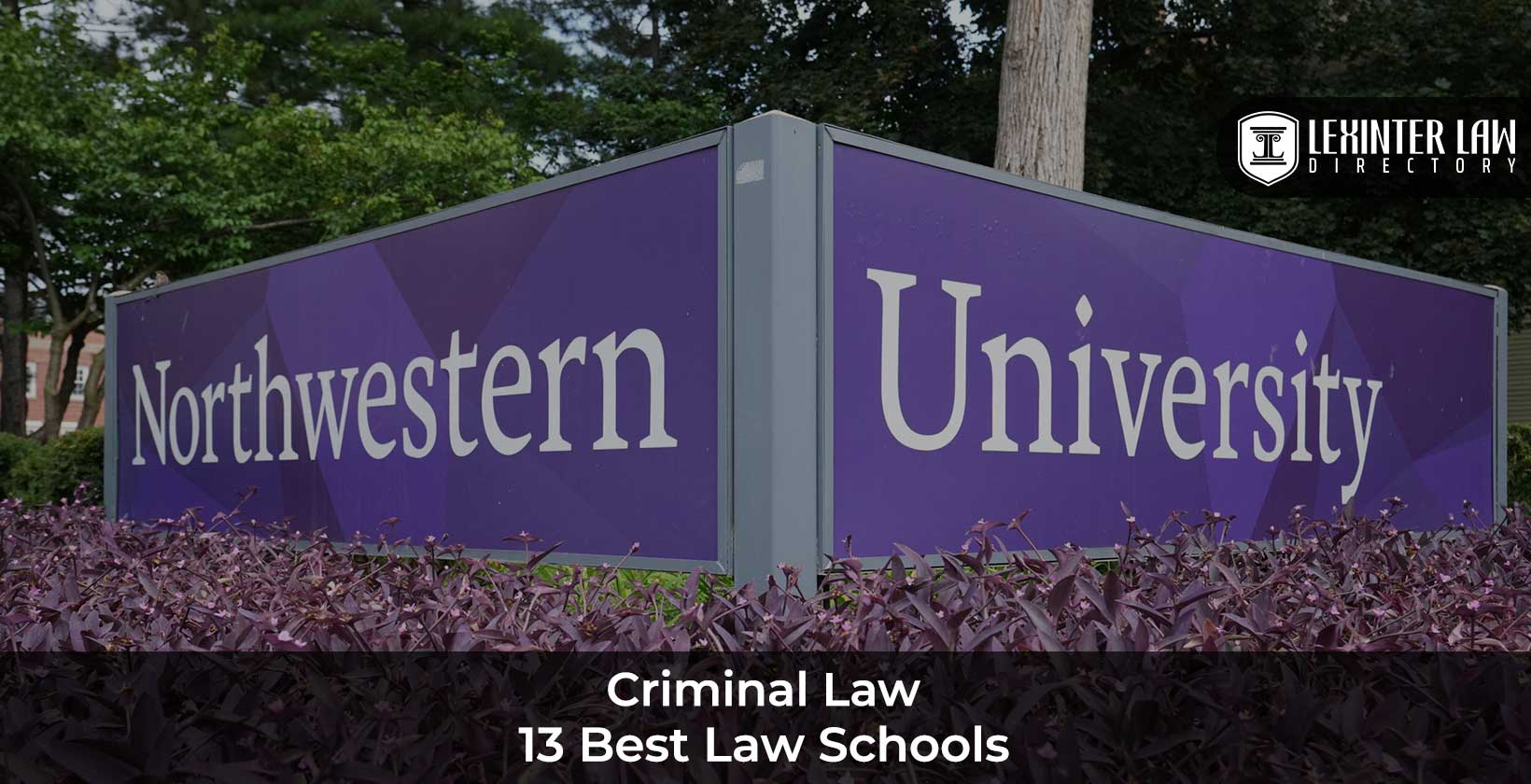13 Best Law Schools For Criminal Law
Selecting the right institution for a criminal law degree is crucial for aspiring legal professionals. The 13 best law schools stand out in criminal law for their exceptional programs and distinguished faculty. The best criminal law schools offer robust academic curricula and provide invaluable networking opportunities and hands-on experiences in criminal law. Harvard University and Yale University lead the rankings. The law schools are known for their demanding academic settings and vast resources dedicated to criminal justice. Stanford University and Columbia University offer comprehensive programs to equip students with a profound understanding of criminal law. The University of Virginia and Georgetown University emphasize theoretical and practical aspects of criminal law, ensuring students graduate with a well-rounded education. The University of California, Los Angeles (UCLA) combines academic rigor with practical training, preparing students for diverse careers in criminal justice. Choosing a top-tier criminal justice school significantly impacts one’s career trajectory, offering a competitive edge in the job market. The institutions are gateways to influential networks, critical thinking skills, and hands-on experiences essential for success in the complex field of criminal law.
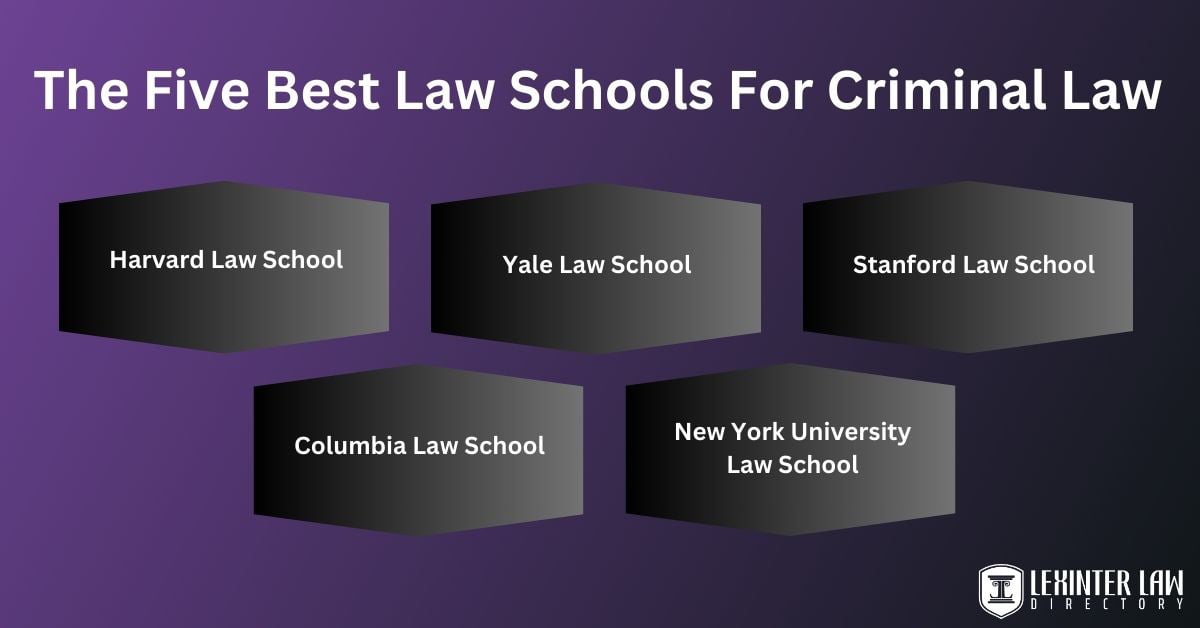
The five best law schools for criminal law are listed below.
- Harvard Law School: Harvard Law School (HLS) in Cambridge, Massachusetts, excels in criminal law. The school offers J.D., LL.M., and S.J.D. programs focusing on experiential learning. The 2023-2024 acceptance rate is 9.58%, with tuition at $78,692 and living costs totaling $33,106. HLS features specialized programs in criminal law through the Criminal Justice Institute. The curriculum includes advanced courses and electives in criminal law.
- Yale Law School: Yale Law School, established in 1824 in New Haven, Connecticut, excels in criminal law. The school offers J.D., LL.M., M.S.L., and J.S.D. programs. The 2023-2024 acceptance rate is 5.58%, with tuition at $76,369 and total attendance costs of $100,469. Specialized criminal law programs include the Jerome N. Frank Legal Services Organization and the Liman Public Interest Program. The curriculum features advanced courses and clinics, with notable faculty and alumni contributing significantly to criminal justice reform.
- Stanford Law School: Stanford Law School, established in 1893 in Stanford, California, excels in criminal law. The school offers JD, LLM, JSD, and joint degree programs, emphasizing interdisciplinary learning. The acceptance rate for 2023-2024 is 7.26%, with tuition at $73,713 and total costs at $105,554. Stanford ranks #1 among law schools and #2 in criminal law. Criminal law programs include the Stanford Criminal Justice Center and the Criminal Defense Clinic. The 2023 graduate employment rate is 97.3%.
- Columbia Law School: Columbia Law School, established in 1858, excels in criminal law. The school offers JD, LL.M., Executive LL.M., and J.S.D. programs with a focus on experiential learning. The acceptance rate for 2023-2024 is 12.23%, with tuition at $81,292 and total costs at $113,711. Criminal law programs include the Criminal Defense Clinic and the Criminal Prosecution Clinic. Clinical opportunities and advanced courses provide practical experience. The 2023 graduate employment rate is 99%.
- New York University Law School: New York University (NYU) School of Law, established in 1835 in Manhattan’s Greenwich Village, excels in criminal law. The school offers JD, dual JD/LLM, JD/MBA, nine specialized LLM degrees, and a JSD program. The acceptance rate for the class of 2024 is 8%, with tuition at $60,438 and total costs at $90,222. Criminal law programs include the Criminal Defense and Reentry Clinic and the Criminal Justice Lab. The 2023 graduate employment rate is 97.67%.
Table of Contents
- 1. Harvard Law School
- 2. Yale Law School
- 3. Stanford Law School
- 4. Columbia Law School
- 5. New York University Law School
- 6. University Of Virginia School Of Law
- 7. Georgetown University Law Center
- 8. Northwestern University Pritzker School Of Law
- 9. University Of Michigan Law School
- 10. UC Berkeley School Of Law
- 11. Duke University School Of Law
- 12. UCLA School Of Law
- 13. Penn Carey Law
- How To Choose The Best Law School For Criminal Law?
- Which Degree Is Best For Criminal Lawyers?
- How To Become A Criminal Lawyer?
- How Long Would It Take To Study Criminal Law?
- What Can You Expect From A Career As A Criminal Lawyer?
- What Is The Difference Between A Criminal Lawyer And A Human Rights Lawyer?
- How Do Criminal Lawyers Earn?
- Where Do Criminal Lawyers Work?
- How To Find Good Criminal Lawyers Near Me With Lexinter?
1. Harvard Law School

Harvard Law School stands out as one of the premier institutions for criminal law. Harvard Law School, established in 1817, is located in Cambridge, Massachusetts. The law school offers a comprehensive legal education with a wide range of specialized courses and clinical programs. Harvard Law School (HLS) offers several law degree programs catering to various educational and professional goals. The three-year Juris Doctor (J.D.) program includes core courses in civil procedure, constitutional law, contracts, criminal law, legislation and regulation, property, and torts, emphasizing experiential learning. The one-year Master of Laws (LL.M.) program, designed for international lawyers, attracts about 180 students annually. The Doctor of Juridical Science (S.J.D.) program, Harvard’s most advanced degree, focuses on legal academia.
Harvard Law School (HLS) has an acceptance rate of 9.58% for the 2023-2024 academic year. The tuition fee for Harvard Law School for the 2024-2025 academic year is $78,692. The living costs include $25,881 for room and board, $1,675 for books, and $5,550 for other personal expenses. Harvard Law School ranks #4 among the best law schools. The law school holds the #2 spot in business/corporate law, contracts/commercial law, and criminal law. Harvard Law’s reputation is built on a legacy of producing influential leaders in various legal sectors, boasting an impressive network of distinguished alumni and world-renowned faculty. The school’s rigorous academic programs and commitment to excellence have cemented its status as a premier institution for legal education.
Harvard Law School offers specialized programs in criminal law, including the Criminal Justice Institute. Harvard Defenders and the Institute to End Mass Incarceration provide unique experiential learning opportunities. Students engage in real-world litigation practice and policy advocacy projects. The programs emphasize theoretical and practical aspects of criminal law. Harvard Law School, one of Massachusetts top law schools, excels in criminal law with notable faculty experts. Alexandra Natapoff specializes in criminal justice and public defense. Andrew Manuel Crespo focuses on the American penal system. Anna Lvovsky brings expertise in policing and the regulation of gender and sexuality. The scholars enhance the program’s academic excellence.
Harvard Law School offers extensive clinical opportunities through its Criminal Justice Institute (CJI). The CJI trains students to become effective criminal defense lawyers by providing hands-on experience representing indigent clients in Massachusetts courts. Students engage in every stage of criminal defense work, from arraignment through trial, including client interviewing, investigation, motions practice, and courtroom advocacy. The CJI’s primary course, “Defense Theory and Practice,” involves representing clients in local district and juvenile courts under faculty supervision. Harvard Law School offers a Criminal Prosecution Clinic for students interested in prosecution.
Harvard Law School offers numerous networking opportunities for students and alumni interested in criminal law. The Office of Career Services (OCS) and the Bernard Koteen Office of Public Interest Advising (OPIA) provide resources and support for career planning. The offices help connect students and alumni with potential employers and offer guidance on career transitions. Harvard’s alumni network is vast, offering opportunities for mentorship and professional connections. Notable alumni in criminal law include Archibald Cox, former Solicitor General of the United States, and Patrick Fitzgerald, former U.S. Attorney for the Northern District of Illinois.
Harvard Law School’s criminal law curriculum includes advanced courses and electives designed to provide in-depth knowledge and practical skills. Students take Advanced Criminal Procedure, focusing on post-arrest procedures, and Criminal Justice Policy, examining systemic issues within the criminal justice system. White Collar Crime explores legal and policy issues surrounding financial crimes. International Criminal Law covers transnational crimes and international tribunals. Evidence Law provides essential skills for litigating criminal cases. Clinical programs offer hands-on experience, allowing students to work on real cases under the supervision of experienced attorneys. The courses equip students with the expertise needed for successful careers in criminal law. Harvard Law School graduates have strong employment outcomes, including criminal law positions across various sectors. The Class of 2023 saw 90.2% securing long-term, full-time legal jobs, with 96.3% obtaining any long-term job.
2. Yale Law School
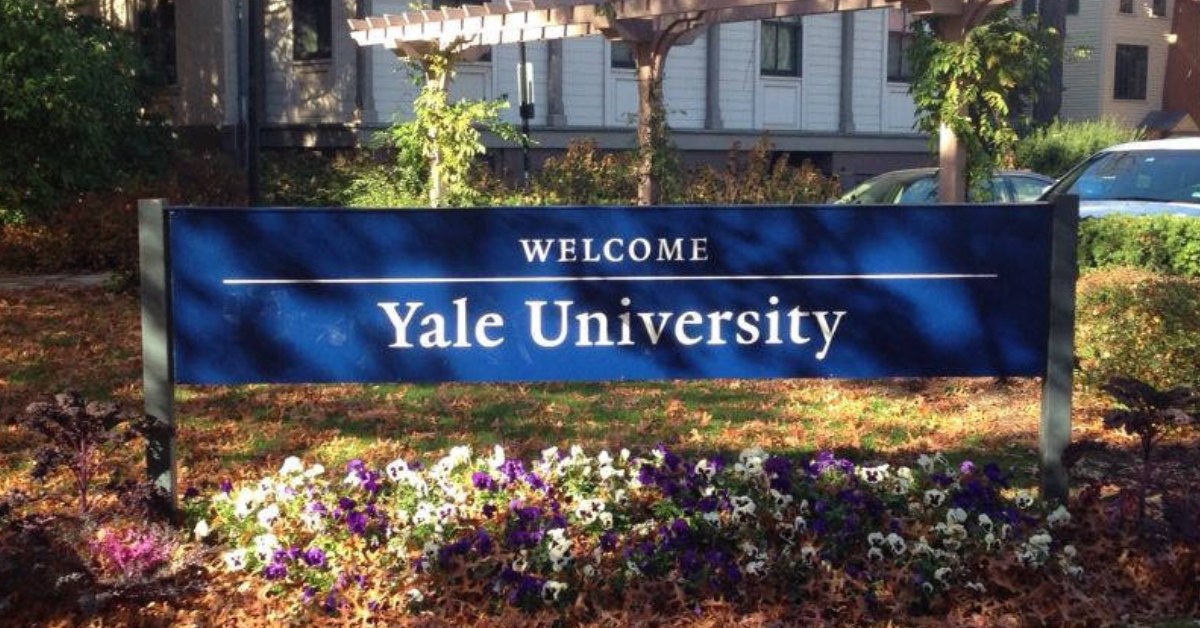
Yale Law School, established in 1824, is located in New Haven, Connecticut. The school’s exceptional criminal law program consistently ranks as one of the best in the nation. Students benefit from a comprehensive curriculum and distinguished faculty specializing in criminal justice. Yale Law School offers a range of programs tailored to diverse interests and career goals. The Juris Doctor (J.D.) program provides rigorous coursework, research opportunities, and practical experience. The one-year Master of Laws (LL.M.) program caters to individuals pursuing careers in legal academia, offering a flexible, research-focused curriculum. Non-lawyers gain foundational legal understanding through the Master of Studies in Law (M.S.L.) Program. Advanced research and academic writing are the focus of the Doctor of the Science of Law (J.S.D.) Program.
Yale Law School has an acceptance rate of 5.58% for the 2023-2024 academic year. Yale Law School’s tuition and fees for the 2024-2025 academic year are $76,369. The total cost of attendance, including living expenses, books, and health insurance, is approximately $100,469.
Yale Law School ranks #1 in Best Law Schools. The law school holds specialty rankings of #12 in Criminal Law, #3 in Constitutional Law, and #2 in International Law. Yale Law School consistently produces influential legal scholars and leaders. Yale Law School offers specialized programs in criminal law with unique features. The Jerome N. Frank Legal Services Organization provides hands-on experience in criminal defense. Students engage in the Liman Public Interest Program, focusing on criminal justice reform. The Yale Law Journal on Criminal Law and Policy allows scholarly exploration of criminal law issues. Yale Law School’s notable criminal law faculty includes Fiona Doherty, who founded the Criminal Justice Clinic to defend indigent clients. James Forman Jr. explores schools, police, and prisons, emphasizing race and class dimensions. Gideon Yaffe researches criminal law and neuroscience intersections. Tracey Meares, an expert on urban policing, directs The Justice Collaboratory. Miriam Gohara represents death-sentenced clients in post-conviction litigation. Elizabeth Hinton examines racial inequality and urban violence. Yale Law School offers exceptional resources and opportunities in criminal law through its faculty.
Yale Law School offers diverse clinical opportunities in criminal law that provide hands-on experience in legal practice and advocacy. Samuel Jacobs Criminal Justice Clinic allows students to represent defendants in New Haven, handling all aspects of their clients’ cases. The Criminal Justice Advocacy Clinic focuses on representing individuals and organizations affected by the criminal legal system. The Challenging Mass Incarceration Clinic addresses issues related to mass incarceration through legal and policy advocacy. The Juvenile Justice Clinic offers representation and advocacy for young clients in various legal settings.
Yale Law School provides extensive networking opportunities through “The Courtyard,” an online alumni community. The Career Development Office offers industry-specific advice and connects students with alumni mentors. Regional Alumni Events organized by the Yale Law School Association facilitate reconnections and networking in criminal law. The Tsai Leadership Program enhances career advising resources for legal and non-legal paths. Notable alumni in criminal law include James Forman Jr., Fiona Doherty, Fatima Goss Graves, and Reginald Dwayne Betts, all making significant contributions to justice reform.
Yale Law School offers advanced and elective courses in criminal law, providing in-depth study and practical experience. Students take Advanced Criminal Procedure, exploring complex issues in criminal litigation. The White-Collar Criminal Defense course focuses on legal strategies and ethical considerations in corporate crime cases. The Sentencing and Punishment course examines theories and practices of sentencing, including alternatives to incarceration. International Criminal Law covers transnational crimes and global justice mechanisms. The Capital Punishment Clinic offers hands-on experience in death penalty defense. Yale Law School’s diverse curriculum prepares students for specialized roles in criminal law. Yale Law School boasts a 99% employment rate for the Class of 2023, including criminal law positions. Graduates secured long-term, full-time roles within ten months of graduation.
3. Stanford Law School
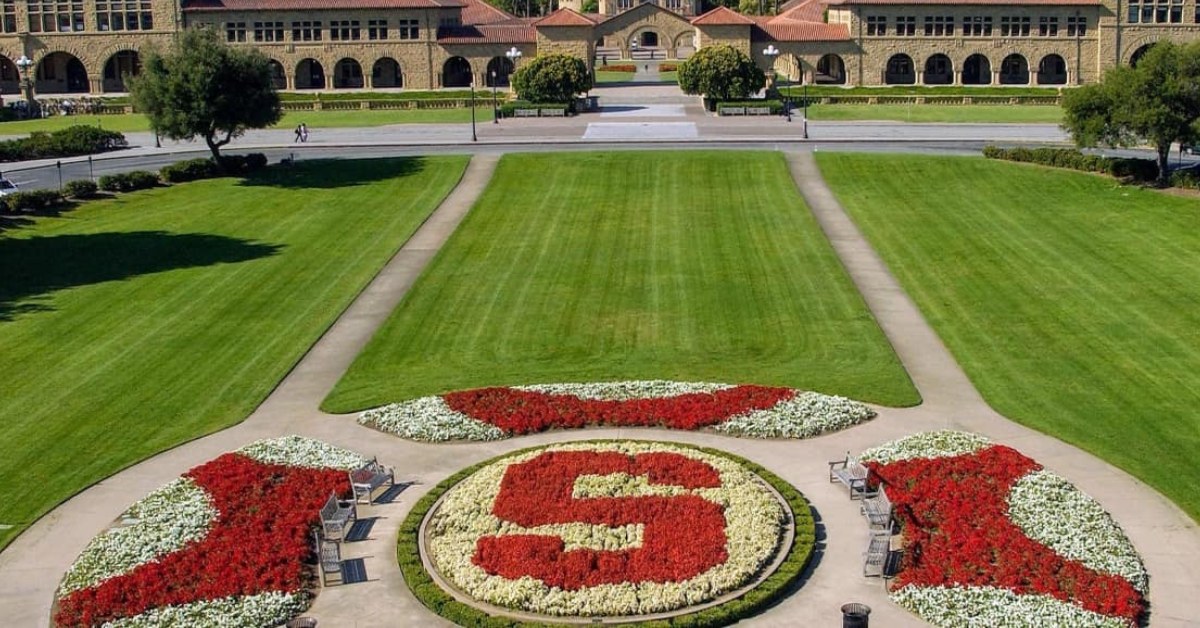
Stanford Law School stands as one of the premier institutions for aspiring criminal law practitioners. The law school, established in 1893, is located in Stanford, California, in the center of Silicon Valley. Stanford Law School offers a diverse range of law degrees, including the JD program, which provides a solid legal foundation and hands-on learning through 11 full-time clinics. The LLM program features specialized tracks, including International Economic Law, Business & Policy, requiring 35 units and core courses like Introduction to American Law. The JSD program targets lawyers pursuing academic careers, emphasizing rigorous scholarly training. Joint degree programs combine a JD with advanced degrees in business, computer science, and more, leveraging Stanford’s interdisciplinary strengths for multifaceted careers.
Stanford Law School has an acceptance rate of 7.26% for the 2023-2024 academic year. Stanford Law School’s tuition and fees for the 2023-2024 academic year are $73,713, reflecting a 6.84% increase from the previous year. The total cost of attendance is approximately $105,554, covering housing, food, personal expenses, and books. Stanford Law School ranks #1 in Best Law Schools (tie). The school ranks #2 in Criminal Law (tie), #1 in Business/Corporate Law, #3 in Constitutional Law (tie), and #2 in Intellectual Property Law. Stanford Law School is renowned for academic excellence, influential faculty, and robust alumni networks, making the institution one of the most prestigious law schools globally.
Stanford Law School offers specialized programs in criminal law, featuring unique experiential learning opportunities. Students participate in the Stanford Criminal Justice Center, focusing on research and policy reform. Another distinctive program is the Criminal Defense Clinic, providing hands-on defense experience. Advanced courses in criminal procedure and international criminal law are available. Students engage with cutting-edge criminal justice issues through seminars and workshops. The programs offer an immersive, comprehensive education in criminal law.
Stanford Law School boasts notable faculty in criminal law. David Alan Sklansky focuses on policing and prosecutorial power. George Fisher leads the Criminal Prosecution Clinic. Ronald Tyler directs the Criminal Defense Clinic and promotes wellness. Robert Weisberg researches recidivism and penal code reforms. Debbie Mukamal works on prisoner reentry and the effects of incarceration on women. Faculty members provide exceptional opportunities for students to engage deeply with criminal justice.
Stanford Law School offers a variety of clinical opportunities for students interested in criminal law. The Criminal Defense Clinic allows students to represent clients in actual criminal cases, providing hands-on experience in defending indigent clients. The Criminal Prosecution Clinic enables students to work with the Santa Clara County District Attorney’s Office, gaining experience in preparing for and conducting preliminary hearings and participating in trials. The Advanced Criminal Defense Clinic offers an opportunity to continue working on more complex legal issues, developing advanced skills in legal analysis, research, and courtroom advocacy.
Stanford Law School’s diverse alumni communities provide robust networking platforms. The Asian Pacific Islander, Black, Indigenous, Latino, LGBTQ+, and Women’s alumni associations facilitate social and professional connections. The Levin Center for Public Service and Public Interest Law offers mentoring programs that connect students with alumni and practitioners in criminal law. The school’s Office of Career Services emphasizes the importance of informational interviews and social media engagement. Stanford Law School has produced notable alumni in criminal law, including Robert Mueller, Kamala Harris, Ronald Noble, and Michael Chertoff.
Stanford Law School offers a diverse range of advanced courses and electives in criminal law. Students explore white-collar crime, examining corporate fraud, insider trading, and bribery. Criminal procedure courses focus on constitutional protections, including the Fourth, Fifth, and Sixth Amendments. International criminal law addresses crimes against humanity, war crimes, and genocide. Sentencing and corrections delve into punishment, parole, and probation principles and practices. Juvenile justice covers the legal responses to youth offending. The death penalty seminar offers an in-depth analysis of capital punishment laws, policies, and cases. Each course provides practical and theoretical insights into the criminal justice system. Stanford Law School’s employment outcomes for recent graduates, including criminal law, are strong. The employment rate for 2023 graduates is 97.3%.
4. Columbia Law School
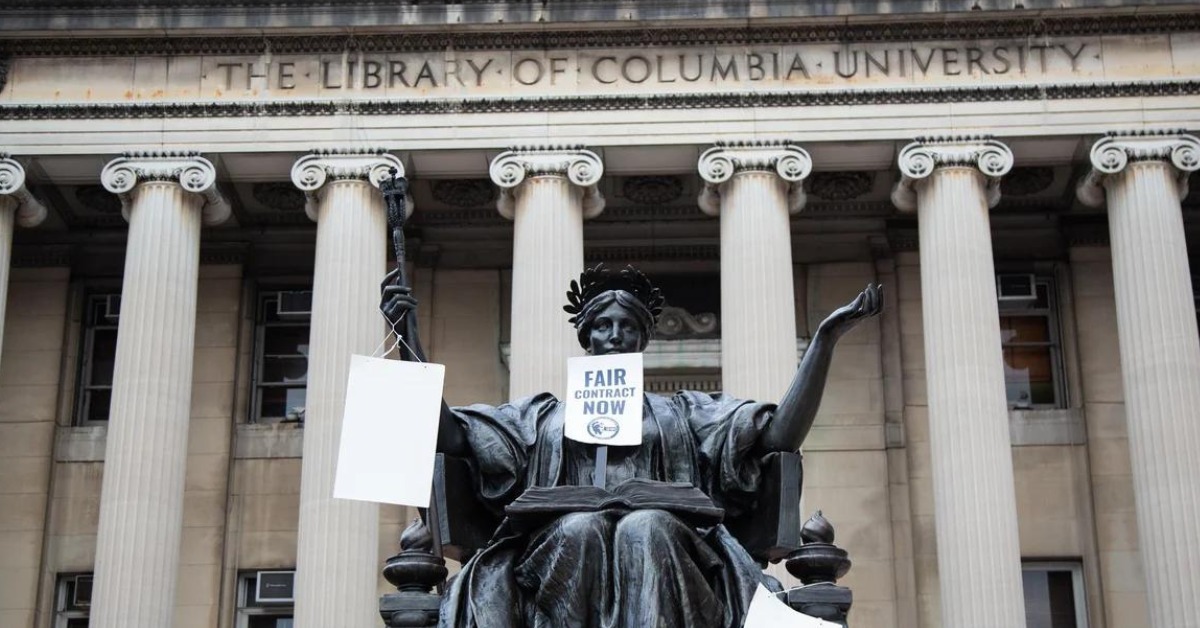
Columbia Law School stands as one of the premier institutions for criminal law, recognized for producing top-tier legal professionals in the field. The law school, established in 1858, ranks among the best globally. Columbia University’s Law School provides diverse law degree programs for various professional goals. The three-year Juris Doctor program emphasizes foundational legal principles, moot court, and electives in upper class years. The Master of Laws targets international lawyers, requiring a mandatory writing project and experiential credits. The six-month Executive LL.M. in Global Business Law combines online and on-campus learning. The Doctor of the Science of Law, designed for academic careers, includes dissertation research.
Columbia Law School’s acceptance rate for the 2023-2024 academic year is 12.23%. Columbia Law School’s tuition and fees total $81,292, with the overall cost of attendance estimated at $113,711 for the 2024 academic year. The average grant amount of $30,000 helps to mitigate the expenses.
Columbia Law School ranks #8 in Best Law Schools. The law school holds the #7 position in Criminal Law, #1 in Contracts/Commercial Law, and #4 in International Law. Columbia Law boasts a distinguished faculty, a robust alumni network, and unparalleled opportunities in legal education and professional advancement. Columbia Law School offers specialized programs in criminal law, including the Criminal Defense Clinic. The Center for Public Research and Leadership focuses on justice and policy reform. Students engage in hands-on experience through the Criminal Prosecution Clinic. Advanced seminars explore topics like white-collar crime and international criminal law. The school’s unique approach combines theoretical study and practical application. Innovative programs such as the wrongful convictions course provide exceptional learning opportunities.
Columbia Law School boasts a distinguished faculty in criminal law. Jeffrey Fagan is recognized for his extensive research on policing, crime, gun control, and race. Brett Dignam leads the Challenging the Consequences of Mass Incarceration Clinic. Bretts’s work focuses on post-conviction litigation and prisoners’ rights, achieving notable victories in cases challenging conditions of confinement and solitary confinement. Matthew C. Waxman, a national authority on national security law, contributes significantly to criminal law discourse. Students benefit from engaging with prominent scholars through theoretical and practical experiences.
Columbia Law School offers several clinical opportunities in criminal law, providing students with hands-on experience in real-world legal settings. The Criminal Defense Clinic, directed by Amber Baylor, focuses on defense representation for individuals facing local criminal charges. Students develop trial advocacy skills, engage in community lawyering, and work on cases involving conditions of incarceration and criminal record consequences. The Challenging the Consequences of Mass Incarceration Clinic, led by Brett Dignam, addresses issues related to mass incarceration through litigation and advocacy. The clinics prepare students for impactful careers in criminal justice.
Columbia Law School offers robust networking opportunities and boasts a distinguished list of notable alumni in criminal law. The Office of Private Sector Careers assists students and alumni in exploring private sector opportunities through career exploration, professional development, and recruitment programs. Columbia LawLink provides an exclusive platform for criminal law graduates to connect, supporting mentorship opportunities. Alumni reunions offer chances to reconnect with former classmates and network with prominent professionals. Notable alumni include Lucy Lang, Margaret Garnett, and Juan Cartagena, who have made significant contributions to criminal justice reform and advocacy.
Columbia Law School offers a comprehensive range of criminal law courses that include advanced and elective options. Advanced Criminal Procedure delves into complex issues surrounding criminal investigations and prosecutions. The Seminar on Criminal Law Theory explores theoretical foundations and contemporary debates in criminal justice. White Collar Crime examines the prosecution and defense of business crimes, focusing on federal laws. The Sentencing and Punishment course covers policies and practices in criminal sentencing. A unique elective, Cybercrime, addresses legal challenges posed by digital offenses. The course offerings provide students with diverse and in-depth knowledge essential for specializing in criminal law. Columbia Law School boasts impressive employment outcomes for graduates, including criminal law positions. 99% were employed ten months after graduation, with the majority in prestigious law firms.
5. New York University Law School
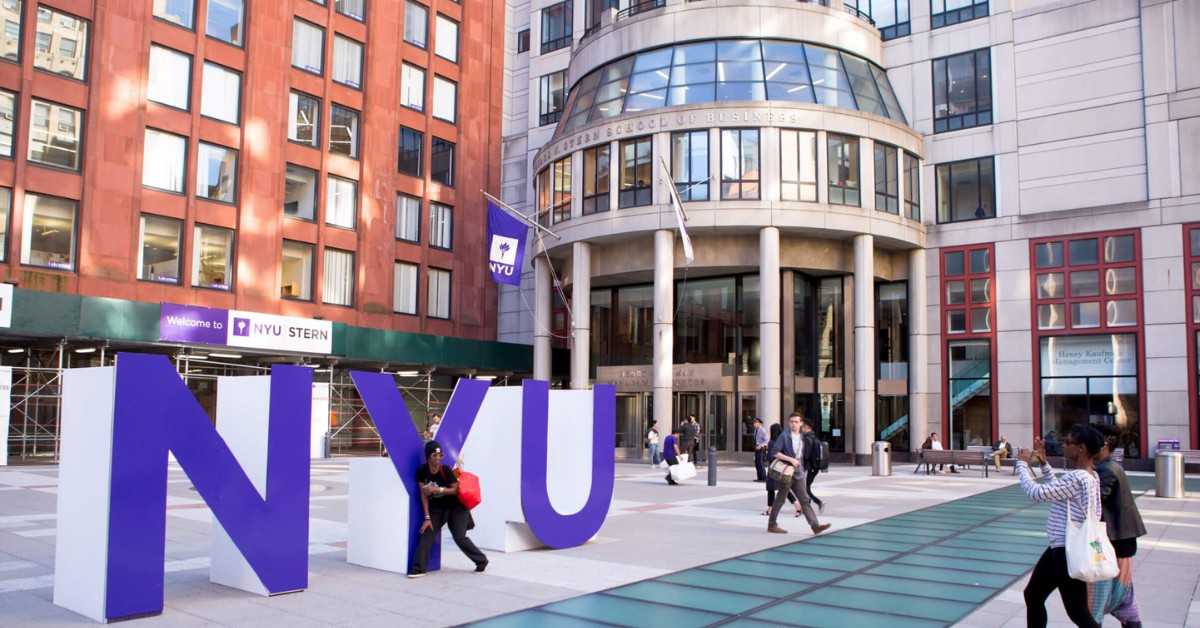
New York University (NYU) School of Law is renowned for its excellence in criminal law, consistently ranking among the top law schools in the field. The law school, established in 1835, is located in Greenwich Village in Manhattan. New York University (NYU) School of Law offers a wide array of law degrees and programs catering to different interests and career goals. The standard JD program requires 83 credits for completion and is a full-time program. Dual JD degrees include a JD/LLM in Taxation and a JD/MBA. NYU offers nine specialized LLM degrees, including Competition, Innovation, Information Law, and Taxation. The Doctor of Juridical Science (JSD) program provides intensive academic research training designed for future academics, offering up to four years of funding while in residency.
New York University (NYU) maintained a highly selective acceptance rate of 8% for the class of 2024. The estimated tuition fee for NYU for the 2024-2025 academic year is $60,438. The total estimated cost of attendance reaches $90,222 per year for on-campus students.
New York University (NYU) School of Law ranks #9 in Best Law Schools. The school holds the #1 position in Criminal Law, #1 in International Law, and #1 in Tax Law. NYU School of Law enjoys a stellar reputation for academic excellence and innovation. The school is recognized as one of the New York top law schools. The law school offers unparalleled opportunities in various legal fields, supported by a distinguished faculty and extensive alumni network.
NYU School of Law offers specialized programs in criminal law with unique features. The Criminal Defense and Reentry Clinic provides hands-on defense and post-conviction advocacy experience. The Center on the Administration of Criminal Law focuses on prosecutorial practices and policy reform. The Criminal Justice Lab addresses systemic issues within the criminal justice system through innovative research and policy initiatives. The programs equip students with practical skills and deep knowledge of criminal law.
NYU School of Law features notable faculty in criminal law, enriching the academic experience. Rachel Barkow, Vice Dean and Charles Seligson Professor of Law is renowned for her expertise in criminal justice reform. Erin Murphy specializes in the intersection of law, technology, and criminal justice, with a focus on forensic science and privacy. Stephen Schulhofer’s research and publications enhance the understanding of criminal justice policies. Peter L. Zimroth significantly impacted the administration of criminal law. The distinguished faculty members contribute to a robust curriculum. NYU School of Law offers diverse clinical opportunities in criminal law. The Criminal Defense and Reentry Clinic provides students with practical experience through work at Brooklyn Defender Services and the Legal Aid Society. The Criminal Appellate Defender Clinic allows students to handle felony conviction appeals, focusing on brief writing and client communication. The Civil Rights in the Criminal Legal System Clinic involves students in litigating civil rights violations related to incarceration. The Crimmigration Clinic addresses the intersection of criminal and immigration law. The clinics provide valuable hands-on training.
NYU School of Law provides exceptional networking opportunities and boasts notable alumni in criminal law. Criminal law clinics and fellowships, such as the Peter L. Zimroth Center Fellowship, offer research and policy work experience. Student organizations, including the NYU Legal Aid Chapter, provide mentorship and practical experience. Career services and the Public Interest Law Center offer tailored panels and workshops. Events like the Leading Lights Speaker Series enhance networking. Notable alumni, including John Gleeson and Ronald Goldstock, exemplify NYU’s influence in criminal law.
NYU School of Law offers a robust curriculum in criminal law, featuring advanced and elective courses. Students enroll in “Advanced Criminal Procedure,” which covers complex procedural issues in criminal cases. “White Collar Crime” examines the prosecution and defense of economic crimes. “Federal Criminal Law” focuses on offenses under federal statutes, while “Comparative Criminal Justice” explores international criminal law systems. “Sentencing Law” delves into theories and practices of punishment. Courses like “Criminal Litigation” provide practical skills through mock trials and simulations. “Juvenile Justice” addresses legal issues affecting minors. The curriculum equips students with comprehensive knowledge and practical skills in criminal law. NYU School of Law boasts a 97.67% employment rate for graduates, including individuals in criminal law. The Office of Career Services plays a crucial role in connecting students to top firms and public service organizations.
6. University Of Virginia School Of Law
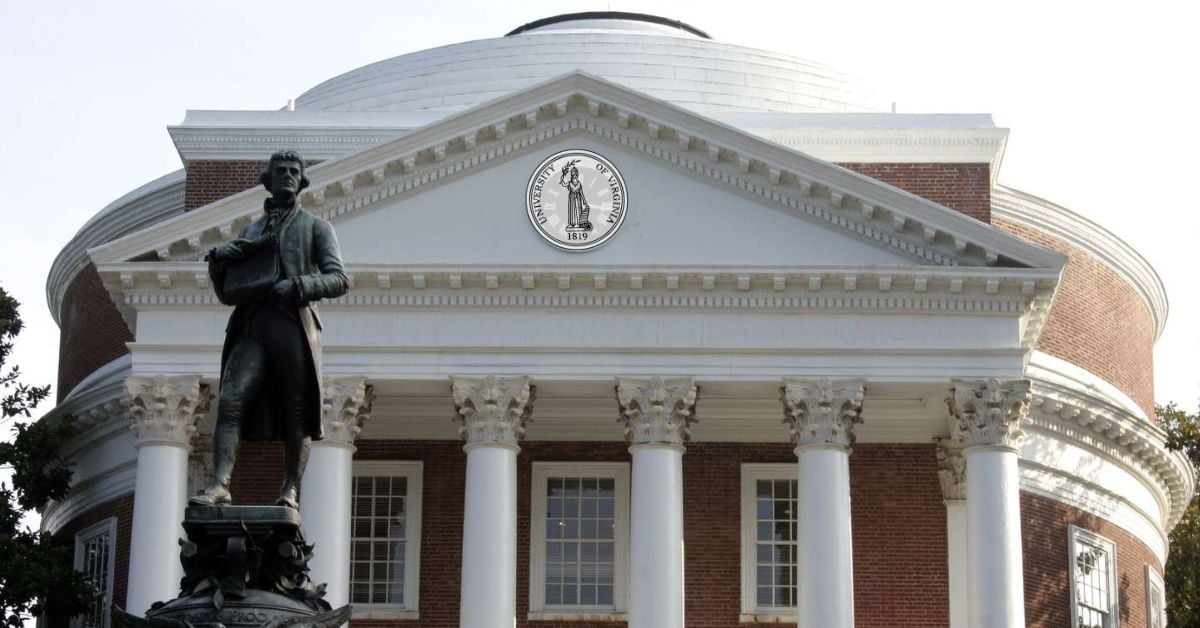
The University of Virginia School of Law excels in criminal law, ranking as one of the best law schools in the field. The school prepares students for impactful careers in criminal justice. The University of Virginia, established in 1819, is situated in Charlottesville, Virginia. The University of Virginia School of Law offers diverse programs, including the Juris Doctor (J.D.), Master of Laws (LL.M.), and Doctor of Juridical Science (S.J.D.). The J.D. program covers Civil Procedure, Contracts, Criminal Law, Torts, Property, and Constitutional Law in the first year. Two hundred fifty elective courses are available in the second and third years. The LL.M. program, designed for international lawyers, integrates students into the UVA Law community. The S.J.D. program focuses on extensive research and writing, leading to a dissertation.
The acceptance rate for the University of Virginia School of Law for the academic year 2023-2024 is 11.46%. Tuition and fees for the University of Virginia School of Law in the academic year 2024-2025 are $74,700 for Virginia residents and $77,700 for non-residents. The total cost of attendance, including living expenses, is estimated at $105,334 for residents and $108,348 for non-residents. The University of Virginia School of Law ranks #4 in Best Law Schools. The law school holds #7 in Criminal Law, #8 in Business/Corporate Law, and #5 in Contracts/Commercial Law. The law school is renowned for its academic excellence and distinguished faculty, consistently producing successful graduates. Strong alumni networks and exceptional resources contribute to the school’s prestigious reputation in the legal community.
The University of Virginia School of Law offers a range of specialized programs in criminal law. The program includes an advanced criminal justice clinic focusing on real-world defense and prosecution cases. Students engage in the Innocence Project, which is dedicated to exonerating wrongfully convicted individuals. A unique feature is the comprehensive trial advocacy training specifically tailored to criminal practice. The programs provide extensive hands-on experience and a strong emphasis on practical skills in criminal law. The University of Virginia (UVA) School of Law boasts distinguished faculty in criminal law. Rachel Harmon is a leading scholar on policing and the law, directing the Center for Criminal Justice. Darryl K. Brown focuses on criminal adjudication and evidence. Anne M. Coughlin specializes in criminal procedure and feminist jurisprudence. Thomas Frampton is recognized for research on jury discrimination and racial exclusion. Josh Bowers examines plea bargaining and ethical dimensions of criminal law. UVA’s faculty offers comprehensive insights into criminal justice.
The University of Virginia School of Law offers several clinical opportunities for students interested in criminal law. The Criminal Defense Clinic lets students represent clients in misdemeanor cases, learning defense strategies and courtroom procedures. The Federal Criminal Sentencing Advocacy Clinic focuses on federal sentencing laws, enabling direct client work. The Prosecution Clinic involves students in trying cases with prosecutors. The Decarceration and Community Reentry Clinic assists with reentry programs and legal advocacy for imprisoned individuals. The clinics provide practical experience in various aspects of criminal law. The University of Virginia School of Law offers numerous networking opportunities and boasts distinguished alumni in criminal law. Student organizations, including the Virginia Innocence Project Pro Bono Clinic, provide platforms for networking with legal professionals. Alumni events, luncheons, and receptions enable students to connect with graduates. Career services and mentorship programs facilitate connections with alumni in criminal law. Robert Mueller, Joyce White Vance, Tim Heaphy, Doug Gansler, and Toby J. Heytens are notable alumni of criminal law.
The University of Virginia School of Law offers advanced courses and electives in criminal law. Students explore the complexities of criminal procedure and evidence in depth. Courses on white-collar crime delve into corporate misconduct and regulatory offenses. Sentencing law examines theories and practices behind criminal punishment. The death penalty seminar covers legal, moral, and procedural issues. Students engage with advanced topics in criminal investigation, focusing on police practices and legal boundaries. Specialized seminars on juvenile justice address legal challenges faced by young offenders. UVA Law’s curriculum provides a comprehensive understanding of advanced criminal law topics. The University of Virginia School of Law boasts impressive employment outcomes for graduates, including criminal law positions. The Class of 2023 achieved a 99.3% employment rate, reflecting the school’s strong reputation and effective career development programs.
7. Georgetown University Law Center
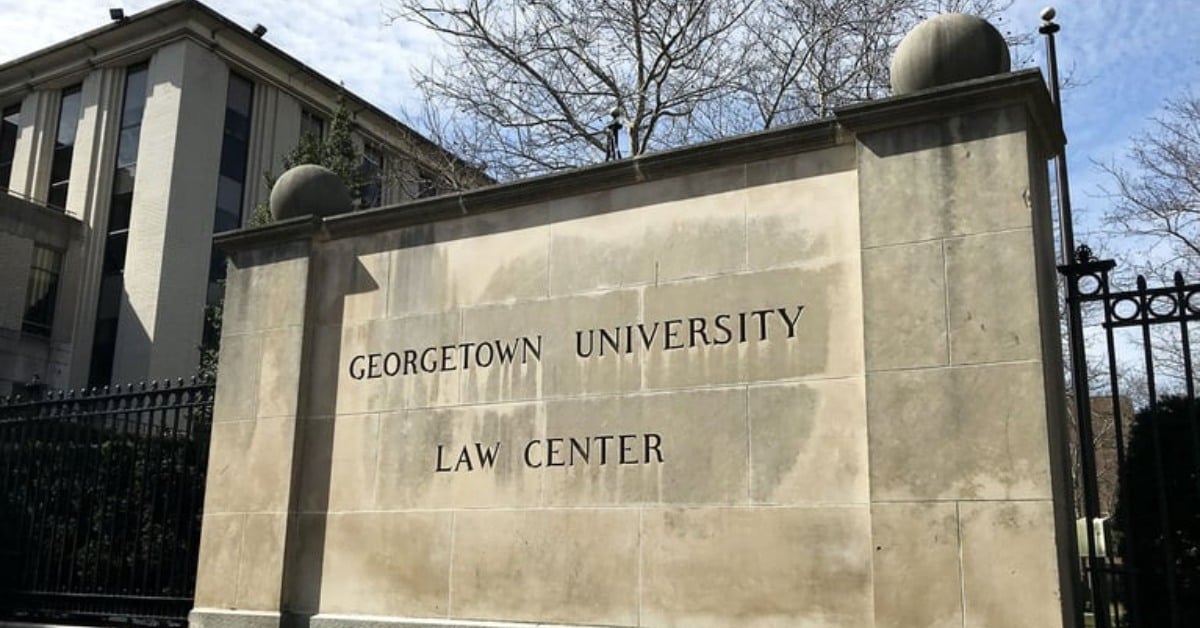
Georgetown University Law Center stands as a premier institution for criminal law, consistently ranked among the top in the nation. The law school, established in 1870, offers a rich tradition of academic excellence and practical training. The law school, located in Washington, D.C., provides unparalleled access to the nation’s highest courts, government agencies, and leading law firms. Georgetown University Law Center offers diverse law degree programs catering to various academic and professional interests. The Juris Doctor (J.D.) program includes full-time and evening options, along with joint and dual degrees. Graduate programs feature Master of Laws (LL.M.) specializations in Environmental and Energy Law, International Business and Economic Law, and Taxation. The Doctor of Juridical Science (S.J.D.) focuses on scholarly legal research. Certificates in International Human Rights and International Taxation further enhance legal expertise.
Georgetown University Law Center has an acceptance rate of 19.57% for the academic year 2023-2024. The 2024-2025 tuition for Georgetown’s full-time J.D. program is $79,672, with total costs estimated at $113,450.
Georgetown University Law Center ranks #14 in Best Law Schools and #1 in Part-time Law. The law school ranks #5 in Criminal Law, #1 in Clinical Training, and #5 in International Law. Georgetown University Law Center maintains a strong reputation for academic excellence and professional opportunities. Esteemed faculty, comprehensive programs, and an extensive alumni network contribute to the school’s prestige and high ranking in various specialties. The law center consistently produces graduates who excel in diverse legal fields. Georgetown University Law Center offers specialized programs in criminal law with unique features. Students engage in hands-on experiences through the Criminal Defense and Prisoner Advocacy Clinic. The Prettyman Fellowship provides advanced training in trial advocacy and criminal defense. International perspectives are emphasized in the Human Rights Institute’s criminal justice initiatives. The Criminal Justice and Policy Program focuses on research and reform in criminal law.
Georgetown University Law Center boasts notable faculty in criminal law. Paul Butler, Albert Brick Professor in Law, focuses on race and criminal justice. David Cole, Hon. George J. Mitchell Professor, specializes in constitutional law and national security. John M. Copacino directs the Criminal Justice Clinic, emphasizing hands-on criminal defense experience. Kristin Nicole Henning, Blume Professor of Law, leads the Juvenile Justice Clinic. Shon Hopwood, Associate Professor, advocates for criminal justice reform. The distinguished faculty members significantly enhance Georgetown Law’s criminal law program.
Georgetown University Law Center offers robust clinical opportunities in criminal law. The Criminal Justice Clinic provides third-year J.D. students hands-on experience in representing misdemeanor defendants. Students handle client interviews, case investigations, and courtroom advocacy. The Criminal Defense & Prisoner Advocacy Clinic focuses on indigent criminal defense and prisoner advocacy. Students work on trial advocacy, client counseling, and compassionate release cases. Each clinic requires a commitment of about 25 hours per week, offering a blend of practical experience and academic learning. The clinics prepare students for careers in criminal law.
Georgetown University Law Center offers extensive networking opportunities in criminal law. The Hoya Lawya Gateway connects alumni and students for professional networking and mentorship. Alumni Career Services provides resources, counseling, and job postings. Regular alumni events, reunions, and forums foster networking and discussions on legal trends. Notable alumni in criminal law include Eric Holder, former U.S. Attorney General, and Patrick Leahy, influential U.S. Senator. Abbe Smith, renowned for her work in criminal defense, directs the Criminal Defense and Prisoner Advocacy Clinic. The opportunities and alumni highlight Georgetown’s support for careers in criminal law.
Georgetown University Law Center offers advanced courses and electives in criminal law. Students enroll in Advanced Criminal Procedure to explore complex legal processes. The White Collar Crime course examines corporate and financial misconduct. International Criminal Law covers global justice and transnational crimes. Evidence focuses on rules and standards for legal proof in criminal cases. Sentencing Law and Policy analyzes principles and practices of criminal sentencing. The Juvenile Justice course addresses legal issues affecting youth in the criminal justice system. The courses provide a comprehensive understanding of various aspects of criminal law, preparing students for specialized legal careers. Georgetown University Law Center has strong employment outcomes for graduates, including criminal law positions. The Class of 2023 secured an 89.3% rate for long-term, full-time legal positions.
8. Northwestern University Pritzker School Of Law
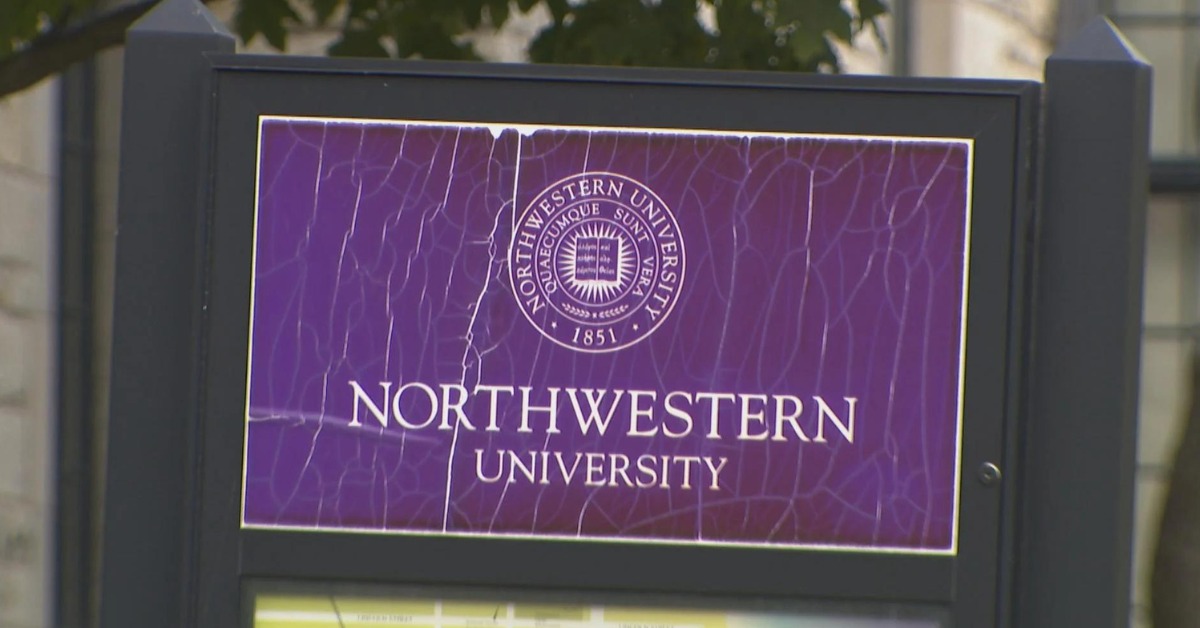
Northwestern University’s Pritzker School of Law is renowned for its excellence in criminal law, ranking among the top law schools in the nation. The law school, established in 1859, offers a rigorous and comprehensive legal education. Northwestern University’s Pritzker School of Law, situated in the vibrant city of Chicago, provides students ample opportunities for internships and practical experience. Northwestern University’s Pritzker School of Law offers diverse law degrees and joint programs. Students pursue a Juris Doctor with specializations like the JD-MBA, JD-PhD, JD-LLM in Taxation, and JD-LLM in International Human Rights. The LLM programs cater to specific legal fields, including taxation and human rights law. The Master of Science in Law (MSL) caters to STEM professionals, while a two-year JD program exists for internationally educated attorneys.
Northwestern University Pritzker School of Law’s acceptance rate for the academic year 2023-2024 is 15.53%. The tuition fee for 2024-2025 is $76,704 for JD programs and $108,606 for the JD-MBA program. The total cost of attendance for a JD student, including living expenses, is $99,872.
Northwestern University’s Pritzker School of Law ranks #9 in Best Law Schools. The law school holds impressive specialty rankings: #15 in Criminal Law, #3 in Tax Law, and #5 in Clinical Training. Dispute Resolution is ranked #7. Northwestern Law boasts a strong reputation for academic excellence and innovative programs. The school excels in producing highly skilled graduates well-prepared for the legal profession.
Northwestern University’s Pritzker School of Law offers specialized programs in criminal law. Students pursue the JD-LLM in International Human Rights, which includes a focus on criminal law. The unique program combines rigorous coursework with an externship component. Another option is the Criminal Law Concentration, designed for students seeking a deep dive into criminal justice. The programs provide practical experience and advanced study, distinguishing them from other law schools.
Notable faculty members at Northwestern Pritzker School of Law specialize in criminal law. Neha Jain, Professor of Law, focuses on international law, human rights, and criminal law. Stephanie Holmes Didwania, Associate Professor, provides empirical research on criminal justice. Ronald J. Allen, the John Henry Wigmore Professor, is recognized globally for expertise in evidence and criminal procedure. Steven A. Drizin, Clinical Professor, co-directs the Center on Wrongful Convictions. The distinguished faculty contributes significantly to academic and practical legal landscapes.
Northwestern Pritzker School of Law offers extensive clinical opportunities in criminal law through the Bluhm Legal Clinic. The Center on Wrongful Convictions focuses on exonerating wrongfully convicted individuals. The Children and Family Justice Center provides legal representation to youth in various legal matters. The MacArthur Justice Center addresses justice and civil rights issues involving police misconduct and prison conditions. Trial Advocacy and Appellate Advocacy Centers offer training in trial and appellate litigation. The Bluhm Legal Clinic emphasizes experiential learning, providing practical skills and confidence.
Northwestern University Pritzker School of Law provides extensive networking opportunities and boasts notable alumni in criminal law. The Career Strategy Center offers lifelong support, career advisors, and networking events. The Bluhm Legal Clinic connects students with professionals through the Center on Wrongful Convictions. Steven Drizin is a prominent alumnus known for his work in wrongful convictions. Sheila Bedi is recognized for her contributions to civil rights and criminal justice reform. The alumni significantly impact the legal landscape.
Northwestern University Pritzker School of Law offers a robust curriculum in criminal law. Students take advanced courses, including “Criminal Procedure: Adjudication,” focusing on the criminal trial process. “Advanced Criminal Law” delves into contemporary issues and legal challenges. Elective courses such as “White Collar Crime” examine corporate and financial crimes, while “Juvenile Justice” explores the juvenile legal system. The course “Federal Criminal Law” provides insight into crimes prosecuted at the federal level. The offerings ensure students gain comprehensive knowledge and practical skills essential for a career in criminal law.
Northwestern University Pritzker School of Law boasts strong employment outcomes for graduates, including criminal law positions. 99% of 2023 graduates secured employment by March 15, 2024, with a median private sector starting salary of $225,000.
9. University Of Michigan Law School
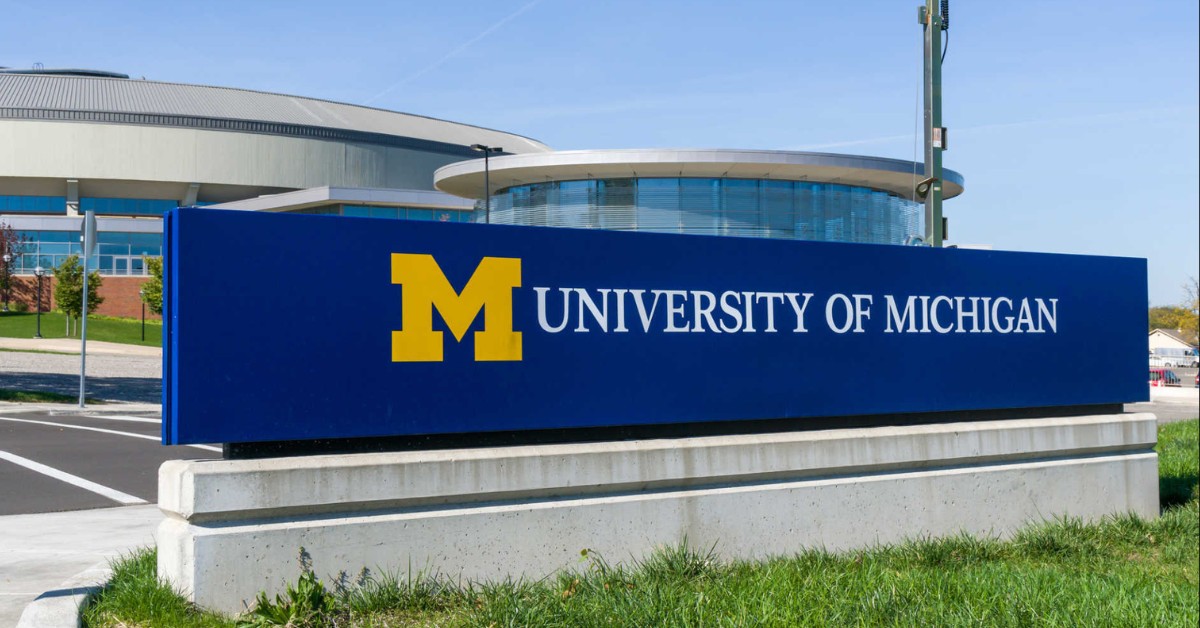
The University of Michigan Law School is one of the best law schools for criminal law. The school, established in 1859, is located in Ann Arbor, Michigan, providing a vibrant academic environment. Students benefit from diverse course offerings, clinical opportunities, and a robust alumni network. The University of Michigan Law School offers various law degrees for different career goals and educational backgrounds. The Juris Doctor (JD) program spans three years. The program starts with foundational courses and later allows for specialization through advanced classes, seminars, clinical work, and independent research. The Master of Laws (LLM) program lasts one year. The program focuses on the U.S. legal system and comparative legal studies for lawyers trained in law globally. The Doctor of Juridical Science (SJD) program requires extensive research under faculty supervision and a dissertation.
The acceptance rate at the University of Michigan Law School is 12.58% for the 2023-2024 academic year. The University of Michigan Law School tuition for the 2023-2024 academic year is $69,584 for Michigan residents and $72,584 for out-of-state students. Living expenses add approximately $24,144 annually, with financial aid available to cover significant costs.
The University of Michigan Law School ranks #9 among the best law schools. The law school ranks #5 in Criminal Law, #6 in International Law, and #7 in Constitutional Law. The University of Michigan Law School boasts a distinguished faculty and a robust alumni network. The school’s commitment to practical training and interdisciplinary studies attracts top-tier students and fosters a dynamic legal education environment.
The institution is considered one of the best law schools among other Michigan top law schools and offers specialized programs in criminal law. Students engage in the Innocence Clinic, focusing on wrongful convictions. The Juvenile Justice Clinic addresses legal issues facing minors. Advanced courses cover sentencing, criminal procedure, and white-collar crime. Externships provide practical experience with prosecutors, defense attorneys, and judges. The school’s research centers and symposia further enhance understanding of criminal justice issues.
The University of Michigan Law School boasts notable faculty specializing in criminal law, providing unmatched expertise. Eve Brensike Primus focuses on criminal procedure and indigent defense reform. Barbara L. McQuade, former U.S. Attorney, specializes in national security and civil rights. Gabriel Mendlow combines criminal law with moral philosophy and has consulted with the United Nations. David A. Moran co-founded the Michigan Innocence Clinic, focusing on wrongful convictions. Samuel R. Gross is an expert in evidence law and false convictions. Faculty members bring diverse perspectives and deep expertise to the program.
The University of Michigan Law School offers clinical opportunities in criminal law, providing hands-on experience. The Civil-Criminal Litigation Clinic (CCLC) allows students to handle civil and criminal cases, taking “first chair” responsibility. The Criminal Appellate Practice Clinic focuses on appellate advocacy, where students represent convicted felons on appeal. The Juvenile Justice Clinic involves representing minors in family courts and adults sentenced as juveniles. The Michigan Innocence Clinic litigates claims of actual innocence, offering students experience in complex criminal procedure cases. The clinics prepare students for careers in criminal law.
The University of Michigan Law School offers numerous networking opportunities and boasts a notable alumni network in criminal law. Alumni events include annual reunions, facilitating connections between graduates and current students. Michigan Law Connect and the Alumni Directory enable networking, mentorship, and career opportunities. Alumni-student mentoring programs provide career insights and engagement with the academic community. Career resources support alumni with job databases and counseling services. Barbara L. McQuade, David A. Moran, and Samuel R. Gross are distinguished alumni of criminal law. The robust alumni network supports successful careers in criminal law and beyond.
The University of Michigan Law School offers a diverse range of advanced and elective courses in criminal law. Students take advanced courses in Criminal Procedure, covering the intricacies of the justice process. Elective options include White Collar Crime, which examines corporate fraud, and Sentencing and Punishment, focusing on post-conviction processes. The Law and Psychology course explores the intersection of psychological principles with legal practice. Students study international criminal law, which addresses global legal standards and practices. Hands-on experience is available through Trial Advocacy and the Criminal Appellate Practice Clinic, enhancing practical litigation skills. The courses provide comprehensive criminal law education. The University of Michigan Law School boasts strong employment outcomes, including criminal law positions. Graduates secure prestigious roles, with 98% finding full-time employment.
10. UC Berkeley School Of Law
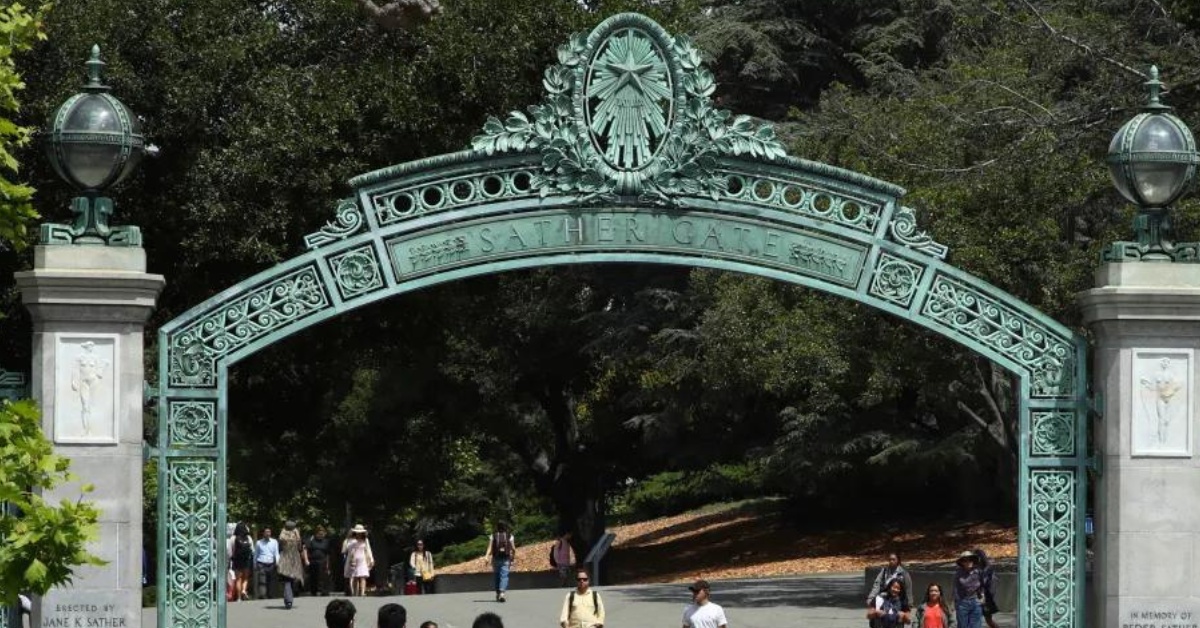
The University of California, Berkeley School of Law excels in criminal law and stands among the best law schools in the field. The school boasts a rich history since its establishment in 1894 Berkeley, California. The University of California, Berkeley School of Law offers diverse law degree programs, including JD, LLM, and JSD. The JD program provides specializations in business law, environmental law, law and technology, and social justice. The LLM program features Traditional and Executive Tracks, catering to different professional needs. The JSD program focuses on advanced academic research. Concurrent degree options with other UC Berkeley schools and external institutions are available.
The institution is considered one of the best law schools among other California top law schools, with an acceptance rate of 14.9% for the 2023-2024 academic year. The estimated tuition and fees at Berkeley Law for the academic year 2024-2025 are $62,567 for California residents and $74,995 for out-of-state students. The total estimated cost of attendance, including living expenses, is $99,401 for residents and $111,829 for non-residents. The University of California, Berkeley School of Law ranks #12 among the best law schools. The law school holds #4 in Criminal Law, #1 in Intellectual Property Law, #2 in Environmental Law, and #5 in Clinical Training. Berkeley Law is renowned for academic excellence and innovative programs. The school’s emphasis on interdisciplinary study and hands-on experience prepares students for successful legal careers.
The University of California, Berkeley School of Law offers specialized programs in criminal law. The Death Penalty Clinic provides hands-on experience with capital cases. The Policy Advocacy Clinic focuses on systemic reform in criminal justice. Students engage with real-world issues through the Criminal Defense Clinic. Advanced courses cover various aspects of criminal law practice and policy. The programs offer unique, practical experiences that prepare students for impactful careers in criminal law. UC Berkeley School of Law boasts notable faculty in criminal law, enhancing its academic reputation. Andrea Roth focuses on criminal law, procedure, and evidence. Chesa Boudin, the founding executive director of the Criminal Law & Justice Center, specializes in racial and social justice. Jonathan Simon examines crime’s role in governance and legal studies. Saira Mohamed is an expert in human rights and international law. The distinguished professors contribute to Berkeley Law’s excellence in criminal law education and research.
UC Berkeley School of Law offers a robust range of clinical opportunities in criminal law. The Death Penalty Clinic provides hands-on experience in high-stakes litigation for death row inmates. The East Bay Community Law Center allows students to provide criminal defense services to under-resourced communities. The Policy Advocacy Clinic focuses on systemic change and criminal justice reform through policy research. The Veterans Law Practicum addresses legal issues affecting veterans, including criminal matters. The clinical programs equip students with practical skills and real-world experience in criminal law. UC Berkeley School of Law offers valuable networking opportunities and has notable alumni in criminal law. The Berkeley Law Alumni Association connects alumni, faculty, and students through events and regional chapters. The Criminal Law & Justice Center provides engagement with professionals and impactful research projects. The Death Penalty Clinic offers practical experience and networking with criminal law professionals. Notable alumni include Chesa Boudin, former San Francisco District Attorney, and Doris “Dobby” Walker, a prominent civil rights lawyer. The opportunities and alumni highlight Berkeley Law’s influence on criminal law.
The University of California, Berkeley School of Law offers a wide range of advanced and elective courses in criminal law. Students explore specialized topics through courses such as Criminal Procedure, which delves into the intricacies of the justice process. White Collar Crime examines corporate fraud and regulatory offenses. The Sentencing and Corrections course focuses on post-conviction processes and punishment theories. Law and Psychology explore the intersection of legal principles and psychological concepts. International Criminal Law addresses global legal standards and practices. The courses provide comprehensive training in criminal law, preparing students for diverse careers. UC Berkeley School of Law boasts strong employment outcomes for graduates, including criminal law positions. The Class of 2023 achieved a 95.7% employment rate nine months after graduation.
11. Duke University School Of Law
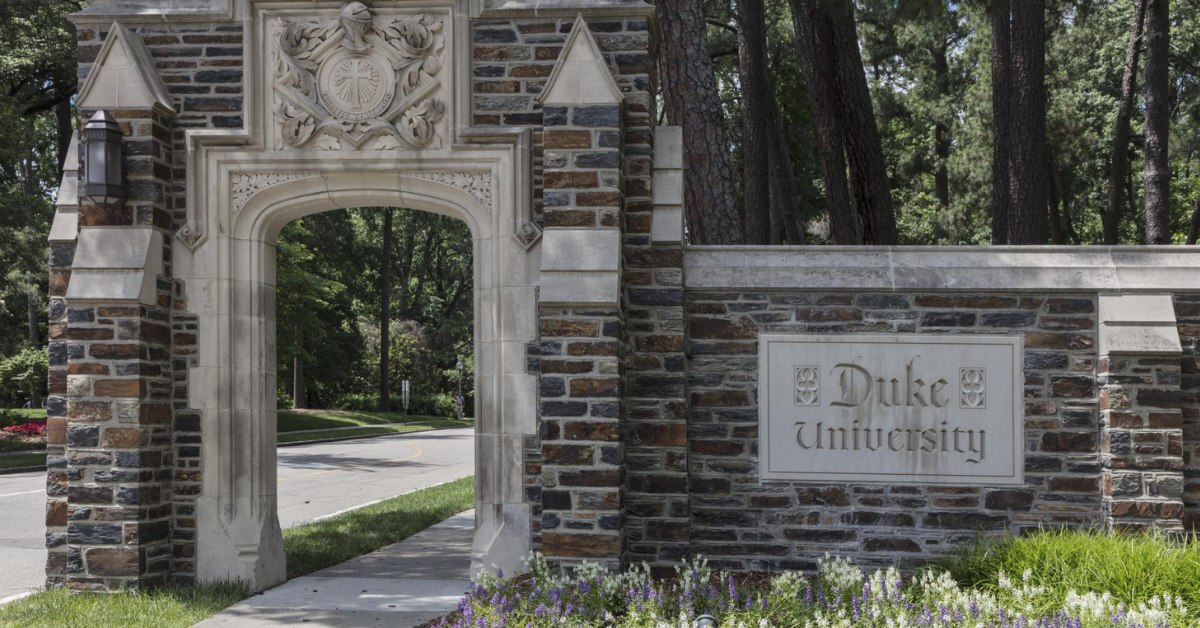
Duke University School of Law is renowned as one of the best law schools for criminal law. Aspiring criminal law experts find exceptional education and training at the institution. Duke Law School, established in 1930 and located in Durham, North Carolina, provides a vibrant academic environment. Duke University School of Law offers several specialized law degree programs catering to diverse career goals. The Juris Doctor (JD) program, known for its rigor and innovation, includes foundational courses in the first year and numerous electives and clinics thereafter. The Master of Laws (LLM) program welcomes foreign law graduates, and the Doctor of Juridical Science (SJD) targets lawyers pursuing academic legal careers. Specialized centers and institutes provide practical training and research opportunities.
The acceptance rate for Duke University School of Law for the 2023-2024 academic year is approximately 10.51%. The tuition for Duke University School of Law for the 2023-2024 academic year is $75,618. Financial aid is available, with 94.96% of full-time students receiving grants or scholarships averaging $30,000. Duke University School of Law ranks #4 among the Best Law Schools. The law school stands at #7 in Criminal Law, #11 in Business/Corporate Law, #10 in Constitutional Law, and #13 in International Law. Duke Law attracts top-tier students and consistently achieves high placement rates in prestigious legal positions. Duke University School of Law offers specialized programs in criminal law, including the Wrongful Convictions Clinic. The clinic focuses on investigating and litigating claims of innocence. Students participate in the Federal Public Defender externship, gaining real-world experience. Unique features include hands-on opportunities and a strong focus on ethical practice and professional responsibility.
Duke University School of Law has notable faculty in criminal law, providing significant expertise and leadership. James E. Coleman, Jr. directs the Wrongful Convictions Clinic and Center for Criminal Justice and Professional Responsibility. Brandon L. Garrett leads the Wilson Center for Science and Justice, focusing on criminal justice outcomes and forensic science. Samuel W. Buell researches white-collar crime and corporate criminal liability. Jamie T. Lau supervises the Wrongful Convictions Clinic, working to exonerate wrongfully convicted individuals. The faculty members greatly enhance the law school’s criminal law program.
Duke University School of Law offers several clinical opportunities in criminal law, providing hands-on experience. The Criminal Defense Clinic involves direct representation of indigent clients in misdemeanor cases. The Wrongful Convictions Clinic, led by Professor James E. Coleman, Jr., works to exonerate wrongfully convicted individuals. The Appellate Litigation Clinic allows students to work on federal appeals in civil and criminal cases. The Center for Criminal Justice and Professional Responsibility addresses wrongful convictions and advocates for systemic reform. The clinics emphasize experiential learning and community engagement.
Duke University School of Law offers a comprehensive curriculum in criminal law with advanced courses and electives. Students take Advanced Criminal Procedure, exploring complex issues in criminal justice. The Federal Criminal Law course covers federal offenses and prosecution. White Collar Crime examines corporate and financial crimes. The Sentencing and Punishment course delves into sentencing guidelines and practices. Students interested in specialized topics enroll in seminars on race and criminal justice, forensic science, and criminal justice policy. The courses provide in-depth knowledge and practical skills essential for careers in criminal law. Duke University School of Law boasts a 97% employment rate for the Class of 2023, including criminal law positions.
12. UCLA School Of Law
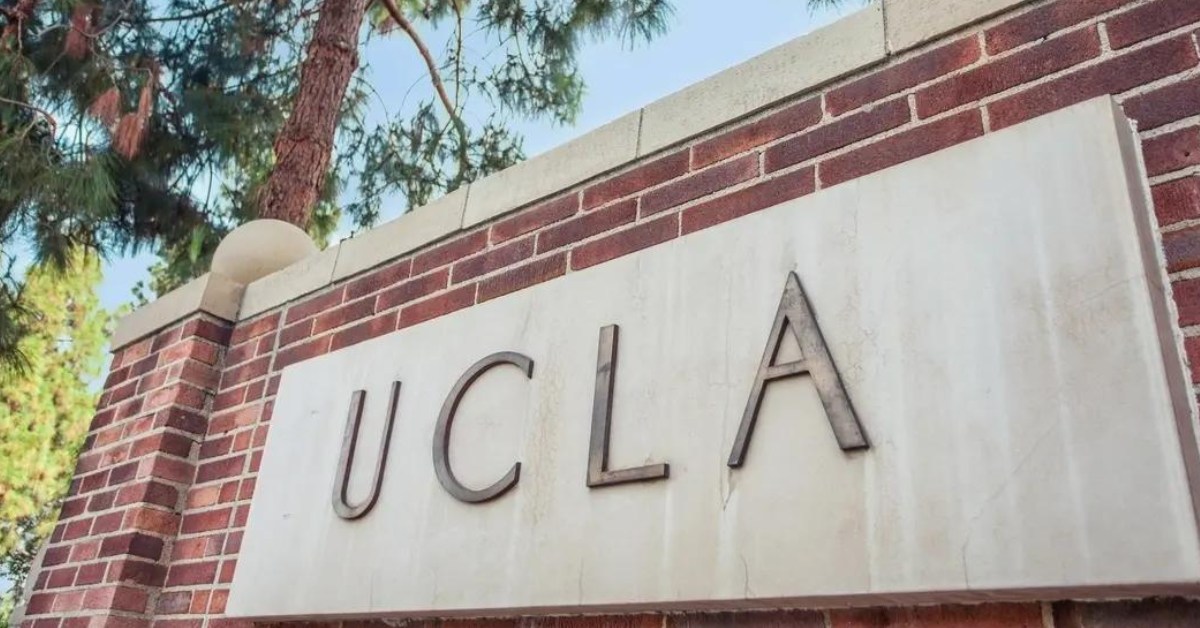
UCLA School of Law stands out as one of the best law schools for criminal law, providing unparalleled education and resources in the field. The law school, established in 1949, is located in Los Angeles, California. UCLA School of Law offers advanced legal degree programs to cater to diverse career goals and academic interests. The Juris Doctor provides a comprehensive legal education, including foundational courses and specializations in Business Law and Environmental Law. The Master of Laws allows lawyers to deepen their knowledge with nine specializations available. The Master of Legal Studies caters to non-lawyers, offering legal principles applicable to various sectors. The Doctor of Juridical Science targets lawyers pursuing academic legal careers involving rigorous research and a significant dissertation.
The acceptance rate for UCLA School of Law is approximately 16.80% for the 2023-2024 academic year. The tuition fees for the 2024-2025 academic year at UCLA School of Law are $59,132 for California residents and $71,377 for non-residents. The estimated total cost of attendance, including tuition, fees, and living expenses, is $90,772 for residents and $103,017 for non-residents. UCLA School of Law ranks #13 in Best Law Schools. The school ranks #7 in Criminal Law, #5 in Environmental Law, #6 in Tax Law, and #4 in Trial Advocacy. Graduates consistently excel in various legal fields, demonstrating strong analytical and advocacy skills. UCLA School of Law offers specialized programs in criminal law, emphasizing hands-on experience. A unique program, the Criminal Justice Program, provides interdisciplinary perspectives. The programs help students develop a comprehensive knowledge of criminal law practice.
UCLA School of Law features several notable faculty members specializing in criminal law. Beth Colgan, a Professor of Law, focuses on criminal law, juvenile justice, and economic sanctions. Ingrid Eagly, a Law professor, explores immigration enforcement and the criminal legal system. Sherod Thaxton, with courtesy appointments in multiple disciplines, conducts empirical legal studies on crime and punishment. Máximo Langer, an expert in international criminal law, has edited and contributed to influential books and journals. The faculty members enhance UCLA’s reputation in criminal law education and research.
UCLA School of Law offers extensive clinical opportunities in criminal law. The Criminal Defense Clinic provides legal representation in trials, sentencing, and post-conviction proceedings. The Prisoners’ Rights Clinic represents incarcerated individuals in various legal matters, including civil rights litigation. The Veterans Justice Clinic focuses on legal issues affecting veterans, providing direct representation and advocacy. Externships with local public defender and prosecutor offices offer practical experience under the supervision of experienced attorneys.
UCLA School of Law offers numerous networking opportunities and boasts notable alumni in criminal law. The UCLA Law Alumni Association connects 22,000 graduates through events and mentorship programs. The Criminal Justice Program’s clinics provide hands-on experience and networking with practicing attorneys. Student organizations host events and discussions, enhancing networking opportunities. Regular symposia bring together students, faculty, alumni, and practitioners to discuss criminal law issues. Vincent Bugliosi, Harland Braun, Laurie Levenson, and Judge Jacqueline Nguyen exemplify the impactful careers of UCLA Law graduates.
UCLA School of Law offers advanced and elective courses in criminal law. Students enroll in Criminal Procedure, focusing on the legal processes in criminal cases. The Sentencing and Corrections course examines sentencing laws and correctional systems. White Collar Crime covers corporate and financial offenses in detail. Advanced topics include Comparative Criminal Justice, analyzing international criminal justice systems. Seminars on contemporary issues in criminal law provide insights into emerging trends. The courses offer a comprehensive understanding of criminal law’s complexities and prepare students for specialized practice.
UCLA School of Law boasts impressive employment outcomes, including in criminal law. Ninety percent of the Class of 2023 secured long-term, full-time legal jobs.
13. Penn Carey Law
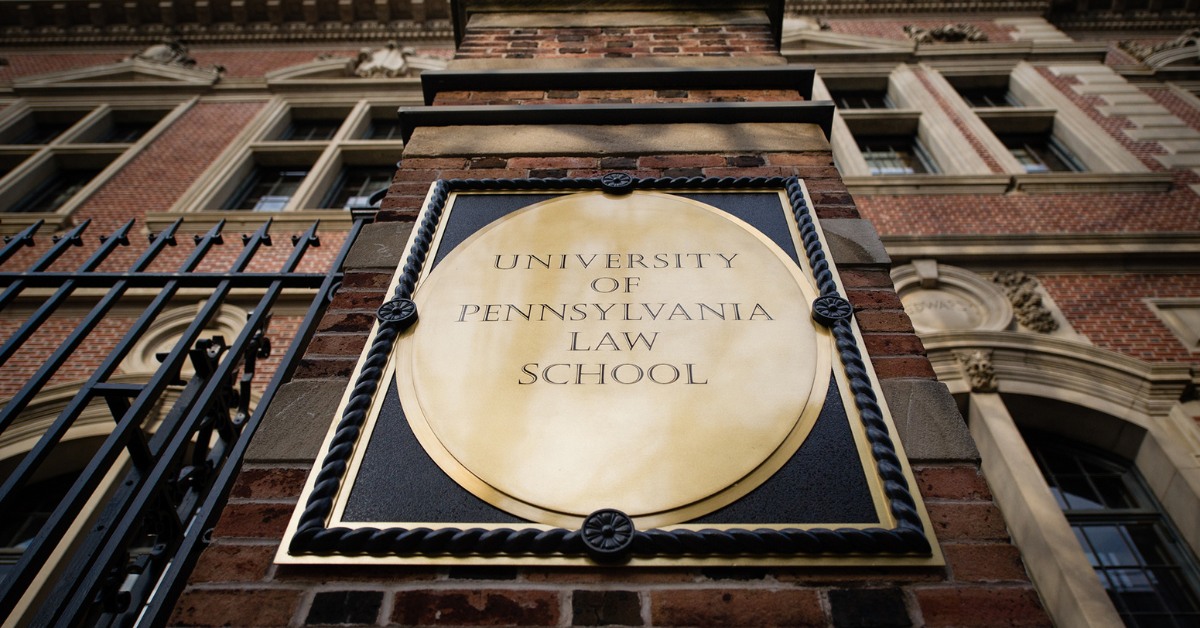
The University of Pennsylvania Carey Law School is renowned for its exceptional criminal law program. The institution, situated in Philadelphia, Pennsylvania, was established in 1850. The University of Pennsylvania Carey Law School offers various law degree programs, including the comprehensive Juris Doctor (JD) program. The JD program requires 86 semester hours over six semesters and emphasizes professional responsibility, experiential learning, and pro bono service. Professionals enhance their expertise through the Master in Law (ML). The one-year full-time Master of Laws (LLM) program caters to international lawyers exploring new legal areas. The Doctor of Juridical Science (SJD), the highest degree, focuses on research and scholarship. Interdisciplinary education, public service, and global legal studies are key aspects that numerous academic centers and institutes support.
The acceptance rate for the University of Pennsylvania Carey Law School is highly competitive, standing at approximately 9.7% for recent admissions cycles. The tuition fee for the 2024-2025 academic year at the University of Pennsylvania Carey Law School is $76,934. The University of Pennsylvania Carey Law School ranks No. 4 in Best Law Schools. The law school holds No. 7 in Criminal Law, No. 4 in Business/Corporate Law, No. 5 in Contracts/Commercial Law, and No. 11 in Constitutional Law.
Pennsylvania top law schools recognize Penn Carey Law’s excellence across the specialties. The school consistently produces leaders in various legal fields and maintains a robust alumni network.
The University of Pennsylvania Carey Law School offers robust specialized programs in criminal law. The Quattrone Center for the Fair Administration of Justice promotes innovative criminal justice research. Practical experience is gained through externships with public defenders and prosecutors. Participation in interdisciplinary centers allows for comprehensive legal training. Advanced courses cover criminal procedure, evidence, and white-collar crime. The programs prepare students for various criminal law careers. The University of Pennsylvania Carey Law School boasts notable faculty in criminal law. Paul H. Robinson, a leading scholar, has authored numerous influential books and articles. Leo Katz bridges criminal law, moral philosophy, and legal theory, enriching fundamental legal concepts. Dorothy E. Roberts focuses on civil rights and criminal justice issues related to race and gender. The experts enhance Penn Carey Law’s criminal law program.
The University of Pennsylvania Carey Law School offers clinical opportunities in criminal law. The Criminal Defense Clinic allows students to represent clients in actual criminal cases. The Youth Advocacy Clinic focuses on juvenile justice, giving students the chance to represent young clients. The Civil Practice Clinic intersects with criminal defense, addressing issues for individuals with criminal records. The clinics provide practical legal experience, enhancing students’ understanding of criminal law. Students are prepared for careers in public defense, prosecution, and criminal justice. The University of Pennsylvania Carey Law School offers numerous networking opportunities, including alumni events that facilitate connections with former classmates, faculty, and legal professionals. Affinity groups foster networking, mentorship, and professional development based on shared interests or backgrounds. Continuing Legal Education events provide CLE credits and networking opportunities for alumni and students. The Law Alumni Society Board of Managers, composed of alumni volunteers, supports student and alumni engagement. Notable alumni in criminal law include Judge Stephanos Bibas, scholar Dorothy Roberts, and criminal law expert Paul H. Robinson.
The University of Pennsylvania Carey Law School offers a comprehensive curriculum in criminal law. Advanced courses include Criminal Procedure, which examines the constitutional framework governing criminal justice. White Collar Crime delves into the intricacies of corporate fraud and corruption. Juvenile Justice focuses on the unique aspects of crimes committed by minors. Sentencing Law and Policy explores the principles and practices of sentencing in criminal cases. Students engage in practical learning through clinics and externships, applying theoretical knowledge to real-world cases. The University of Pennsylvania Carey Law School boasts impressive employment outcomes for graduates, including criminal law positions at top firms. Graduates from the class of 2020 enjoy a 99.6% employment rate, with median salaries of $190,000 in the private sector and $60,000 in the public sector.
How To Choose The Best Law School For Criminal Law?
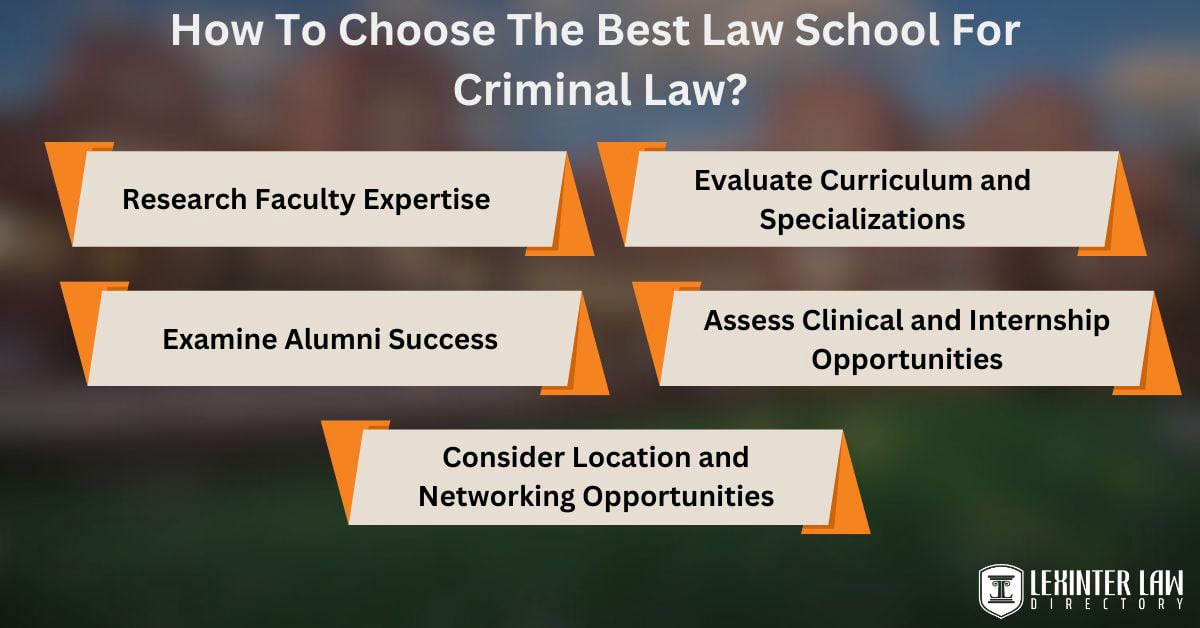
To choose the best law school for criminal law, follow the five steps listed below.
- Research Faculty Expertise. Investigate the faculty’s expertise in criminal law. Look for professors with significant experience, publications, and contributions to the field. Faculty members who are well-respected practitioners or scholars in criminal law provide valuable insights, mentorship, and networking opportunities. The depth of their knowledge and their professional connections greatly enhance the educational experience.
- Evaluate Curriculum and Specializations. Review the curriculum to ensure a strong emphasis on criminal law. Identify law schools that offer specialized courses, clinics, and internships focused on criminal law practice. A robust selection of relevant electives and practical training opportunities better prepare students for careers in criminal law. Schools with comprehensive criminal law programs provide a more in-depth and practical learning experience.
- Examine Alumni Success. Investigate the success of alumni working in criminal law. Graduates holding prominent positions in criminal justice, public defense, prosecution, or criminal litigation reflect the school’s ability to prepare students effectively. High employment rates in relevant positions indicate strong career support and a good reputation among employers. Alumni achievements serve as a reliable indicator of the school’s strengths.
- Assess Clinical and Internship Opportunities. Explore the availability and quality of clinical programs and internships related to criminal law. Practical experience is crucial in the legal field, and schools offering robust clinical programs or partnerships with criminal justice organizations provide hands-on learning opportunities. Engaging in real-world cases and working with professionals in the field helps students apply theoretical knowledge and gain practical skills.
- Consider Location and Networking Opportunities Evaluate the location of the law school for potential networking and job opportunities in criminal law. Schools in areas with a high concentration of law firms, courts, and criminal justice organizations offer better access to internships, clerkships, and employment. A strong local legal community facilitates valuable connections, enhancing internships and future employment prospects.
What Is Criminal Law?
Criminal Law is a body of law pertaining to crimes and their punishments. The law encompasses various statutes and regulations established by local, state, and federal governments to ensure public safety and order. Violations of criminal law are offenses against the state or public, differentiating the law from civil law, which addresses disputes between individuals or organizations. The main purpose is to deter and punish unlawful behavior, rehabilitate offenders, and protect society. A robust understanding of criminal law is essential for individuals aiming to work within the justice system. Criminal law ensures accountability and justice, which is critical in maintaining societal order and safety. A criminal law degree is an academic program focusing on the study of laws related to criminal behavior. Students in criminal law programs learn about various aspects, including criminal procedure, evidence, constitutional protections, and the roles of law enforcement and legal practitioners. The programs offer a comprehensive understanding of the judicial process, from the investigation and arrest of suspects to trial and sentencing.
Criminal law covers the body of laws that define criminal offenses and regulate the apprehension, charging, and trial of suspected individuals. The legal domain includes the penalties and treatment of convicted offenders. Crimes addressed by criminal law include felonies and misdemeanors. Felonies encompass murder, rape, and robbery, resulting in severe punishments like imprisonment for more than a year or even the death penalty. Misdemeanors, on the other hand, refer to less severe offenses, including petty theft or minor assaults, usually punished by fines or imprisonment for less than a year.
Key aspects of criminal justice law cover procedures for investigating crimes, the rights of the accused, and the standards for proving guilt. Police and other law enforcement agencies play a significant role in the investigation and gathering of evidence. The accused individuals are entitled to legal representation, a fair trial, and the presumption of innocence until proven guilty beyond a reasonable doubt. Criminal law covers crimes against property, including theft, burglary, arson, and vandalism. White-collar crimes, including fraud, embezzlement, and insider trading, are included in criminal law. Legal systems ensure that laws remain just, maintaining order and protecting citizens from harm and injustice.
What Is The Main Goal Of Criminal Law?
The main goal of criminal law is to maintain public order and safety by defining and regulating conduct considered threatening, harmful, or otherwise endangering to individuals and society. The purpose of criminal law is to deter criminal activities, rehabilitate offenders, provide retribution for wrongdoings, and protect victims and the community. Criminal law seeks to ensure justice and uphold the rule of law by establishing legal standards. Society enforces norms and values through criminal law, ensuring that everyone adheres to a common standard of behavior. Criminal laws establish what constitutes a crime and prescribe penalties for individuals found guilty. The penalties range from fines and community service to imprisonment and capital punishment in certain jurisdictions. The purpose of criminal law is to punish offenders and discourage others from engaging in similar behavior, thereby promoting a safer community.
Criminal law works by defining prohibited behaviors and specifying the penalties for engaging in the behaviors. Legislation enacted by government bodies establishes the laws, and the judicial system interprets and applies them. Criminal cases begin when law enforcement agencies investigate suspected violations. Prosecutors file charges against the accused individuals if sufficient evidence is found. The accused faces a trial, where the prosecution and defense present their cases. Courts play a critical role in determining guilt or innocence. Judges oversee the legal process, ensuring fairness and adherence to procedural rules. Juries, when used, evaluate the evidence and decide on the verdict. Convictions result in sentencing, which includes imprisonment, fines, community service, or other forms of punishment. Sentences aim to serve justice, deter crime, rehabilitate offenders, and protect society. Defendants have rights protected by the Constitution, including the right to a fair trial, legal representation, and protection against self-incrimination. Appeals are made if there are grounds to believe that legal errors affected the trial’s outcome. Criminal law continuously evolves through new legislation, judicial interpretations, and societal changes, maintaining its relevance and effectiveness in addressing crime.
What Is The Benefit Of Criminal Law?
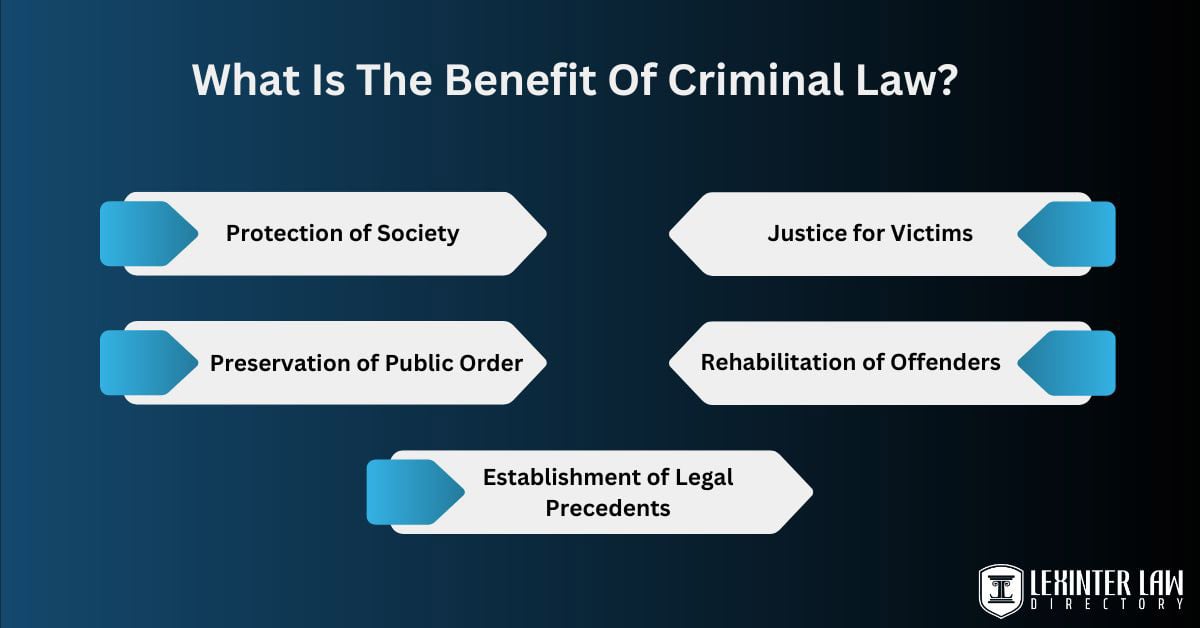
The five benefits of criminal law are listed below.
- Protection of Society: Criminal law safeguards society by deterring individuals from engaging in harmful behaviors. Criminal law discourages potential offenders and reduces the incidence of crime by defining criminal acts and imposing penalties. Effective enforcement of the laws creates a safer environment for citizens, contributing to the overall well-being and security of the community. The protective framework helps maintain order and prevents chaos within society.
- Justice for Victims: Victims of crimes receive a sense of justice through criminal law. Criminal law ensures that perpetrators are held accountable for their actions, providing closure and a sense of retribution for individuals harmed. Legal proceedings allow victims to voice their experiences and seek redress, reinforcing their faith in the judicial system. Justice delivered through criminal law helps victims heal and rebuild their lives.
- Preservation of Public Order: Maintaining public order remains a key function of criminal law. The law establishes rules and norms for acceptable behavior, helping prevent activities that disrupt social harmony. Criminal law preserves a stable and orderly society by addressing offenses, including theft, assault, and vandalism. Law enforcement agencies enforce the regulations, ensuring that peace and order are maintained, which is essential for the smooth functioning of communities.
- Rehabilitation of Offenders: Rehabilitation programs offered within the criminal justice system aim to reform offenders and reintegrate them into society. The initiatives focus on addressing the root causes of criminal behavior, including substance abuse or lack of education. Rehabilitation efforts include counseling, education, and vocational training, helping offenders develop skills to lead law-abiding lives. Successful rehabilitation reduces recidivism, benefiting the individual and society.
- Establishment of Legal Precedents: Criminal law plays a crucial role in establishing legal precedents that guide future judicial decisions. Courts interpret and apply laws in specific cases, creating a body of case law that influences subsequent rulings. The precedents provide consistency and predictability in the legal system, ensuring that similar cases are treated similarly. Legal precedents help judges make informed decisions, contributing to the fair and equitable administration of justice.
Which Degree Is Best For Criminal Lawyers?
The Master of Laws (LL.M.) in criminal law is the best degree for criminal lawyers. The Master of Laws (LL.M.) in criminal law is ideal for criminal lawyers, providing specialized knowledge and skills surpassing a general law degree. The advanced program delves deeply into the complexities of criminal law, encompassing criminal procedure, evidence, and advanced topics in substantive criminal law. Graduates emerge with a profound understanding of the intricacies involved in criminal cases, which is indispensable for effective practice. Comprehensive coursework in an LL.M. program covers international criminal law, white-collar crime, and forensic evidence. The specialized focus equips lawyers with the expertise to handle complex criminal cases, enhancing their ability to strategize and advocate effectively. Mastery in the legal areas is crucial for distinguishing oneself in a competitive legal landscape.
The LL.M. in Criminal Law offers a global perspective, addressing international criminal law issues and transnational crime. Exposure to diverse legal systems and practices prepares graduates for careers in various jurisdictions, enhancing their adaptability and marketability. Employers value the advanced training and specialization that an LL.M. provides, considering graduates for higher-level positions within law firms, government agencies, and non-profit organizations. Advanced research opportunities in an LL.M. program contribute significantly to a deeper understanding of criminal law. Students engage in scholarly research and publish their findings, which influence policy and practice in the field. The degree serves as a stepping stone for lawyers pursuing academic careers or further legal studies, including a Doctor of Juridical Science (S.J.D.). The LL.M. in Criminal Law provides the most comprehensive and focused education for criminal lawyers, combining deep theoretical knowledge, practical experience, and professional development opportunities. The advanced degree offers a clear pathway to becoming a highly skilled and respected criminal law practitioner.
How To Become A Criminal Lawyer?
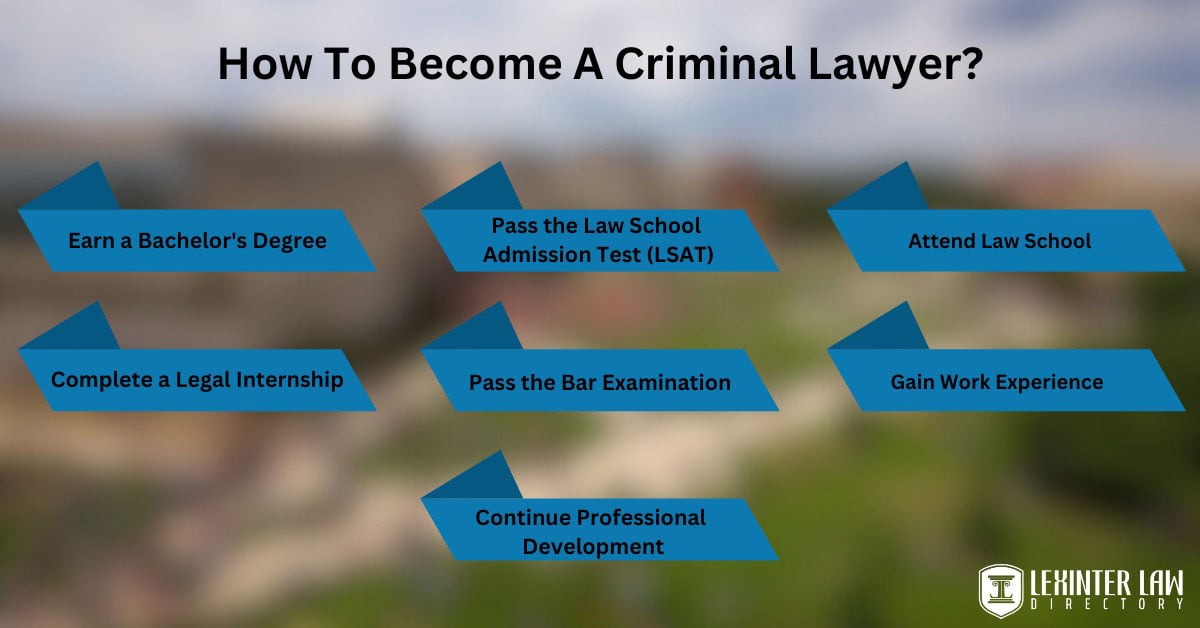
To become a criminal lawyer, follow the seven steps listed below.
- Earn a Bachelor’s Degree: Obtain a Bachelor’s degree in a relevant field that includes political science, criminal justice, or public administration. The programs provide foundational knowledge essential for a legal career. Focus on developing research, critical thinking, and writing skills, as the skills are crucial for law school success. Participate in extracurricular activities and debate clubs to strengthen analytical abilities.
- Pass the Law School Admission Test (LSAT). Passing the LSAT is a crucial step in becoming a criminal lawyer. The LSAT measures skills in reading comprehension, analytical reasoning, and logical reasoning. High LSAT scores increase the chances of admission into a reputable law school. Consider enrolling in LSAT prep courses and taking practice tests to improve performance.
- Attend Law School. Enroll in an American Bar Association (ABA)-accredited law school to earn a criminal law degree. The law school curriculum includes courses in criminal law, constitutional law, and legal writing. Engage in internships or clerkships with criminal defense firms or public defenders to gain practical experience. Participate in moot court and other legal competitions to hone litigation skills.
- Complete a Legal Internship. Securing internships with criminal defense attorneys or law firms during law school is crucial. The internships offer practical experience and insights into the daily responsibilities of a criminal lawyer. Networking opportunities and mentorship from experienced professionals provide valuable guidance and career advancement.
- Pass the Bar Examination. Passing the Bar examination is essential to practicing law after law school graduation. The Bar exam tests knowledge of state-specific laws and general legal principles. Preparation for the Bar exam generally involves intensive study and review courses. The journey of how to become a criminal lawyer includes successfully passing the Bar exam, which grants a license to practice law in the respective state.
- Gain Work Experience. Begin working as a criminal lawyer by joining a law firm, working as a public defender, or starting a private practice. Real-world experience in handling criminal cases helps build expertise and reputation. Taking on various cases, from misdemeanors to felonies, allows for developing a comprehensive understanding of criminal law and courtroom procedures.
- Continue Professional Development. Engage in continuous professional development through attending legal seminars, workshops, and continuing legal education (CLE) courses. Staying updated on changes in criminal law, new legal precedents, and emerging defense strategies is crucial. Joining professional organizations like the National Association of Criminal Defense Lawyers (NACDL) provides networking opportunities and access to resources.
How Long Would It Take To Study Criminal Law?
It would take at least seven years to study criminal law. Studying criminal law is a rigorous and extensive journey requiring significant time and effort. Prospective criminal lawyers must commit at least seven years to their education, encompassing undergraduate and law school studies. The path begins with a four-year Bachelor’s degree, generally in criminal justice, political science, or psychology. The undergraduate years are crucial for building a strong foundation in critical thinking, analytical skills, and a basic understanding of the legal system. Aspiring criminal lawyers must apply to law school upon completing a Bachelor’s degree. Admission to a reputable institution is highly competitive, requiring strong academic performance, high LSAT scores, and a well-rounded application with extracurricular involvement and leadership qualities.
Law school spans three years and focuses intensely on constitutional law, criminal procedure, evidence, and ethics. The first year of law school introduces students to fundamental principles of law through core courses. The second and third years offer opportunities to specialize in criminal law via elective courses, internships, and clinical programs that provide hands-on experience. Participation in moot court competitions, internships with law firms, or clerkships with judges is highly encouraged to gain practical insights and professional connections. Completing law school does not mark the end of the journey. Graduates must pass the Bar examination in the state where they wish to practice. The Bar exam is a comprehensive and challenging test that assesses knowledge of state-specific and general legal principles. Preparation for the Bar exam generally takes several months of intensive study and review.
New lawyers begin their careers as associates in law firms, public defenders, or prosecutors’ offices after passing the Bar exam, gaining practical experience through legal roles is essential for developing expertise in criminal law. Continuing education and professional development are important as laws and legal precedents continually evolve. The journey to becoming a criminal lawyer requires dedication, perseverance, and a passion for justice. Aspiring criminal lawyers must be prepared for a demanding yet rewarding career path that ultimately contributes to upholding justice and the rule of law in society.
Is Criminal Law Difficult?
Yes, criminal law is difficult. Criminal law presents numerous challenges due to its complexity and the serious consequences of the practice. One major difficulty lies in the intricate and detailed nature of legal statutes and precedents. Lawyers must have an in-depth understanding of a vast body of laws and how they interact. The legal understanding requires extensive study and continuous learning to keep up with new rulings and legal interpretations. Navigating the judicial system adds another layer of difficulty. Each case involves multiple stages, including investigation, pre-trial motions, plea bargaining, trial, and sentencing. Guiding a case successfully through the stages demands precise knowledge and strategic planning. Mistakes lead to significant repercussions, including wrongful convictions or unjust acquittals.
The emotional and ethical aspects of criminal law further complicate the field. Defending or prosecuting individuals accused of serious crimes involves moral dilemmas and substantial emotional strain. Attorneys deal with sensitive and traumatic information, requiring them to maintain professional detachment while providing compassionate representation.
The adversarial nature of criminal law, where attorneys for the defense and prosecution vigorously contest each other’s claims, creates a challenging and demanding environment. The legal system requires attorneys to be exceptionally prepared, articulate, and resilient. Preparing for court involves extensive research, witness preparation, and the development of a coherent and compelling narrative. Criminal law demands proficiency in various legal practice areas, including constitutional law, procedural law, and evidence law. Each of the areas has its own set of rules and nuances that attorneys must master. Effective representation requires a comprehensive understanding of the fields and the ability to apply them strategically in court. Mastery of multiple legal disciplines is essential, making the field one of the most challenging in the legal profession.
What Can You Expect From A Career As A Criminal Lawyer?
You can expect diverse salaries, substantial benefits, and significant career growth through networking and continuous learning from a career as a criminal lawyer. A career as a criminal lawyer offers a dynamic and challenging professional path characterized by high stakes and a significant impact on clients’ lives. Salaries for criminal lawyers vary widely based on experience, location, and the size of the law firm. Entry-level criminal lawyers generally earn between $50,000 and $90,000 annually.
Salaries range from $80,000 to $150,000 annually as experience and reputation grow. Top-tier criminal defense attorneys in major cities earn upwards of $200,000 annually. Compensation in the criminal law field includes benefits beyond the base salary. Prestigious law firms provide comprehensive benefits packages, including health insurance, retirement plans, and paid time off, to attract and retain top legal talent. Large law firms and public sector positions offer bonuses, continuing education opportunities, and loan repayment assistance. The benefits are especially valuable for recent graduates with significant student debt.
Career growth opportunities in criminal law are substantial. Criminal lawyers begin their careers as public defenders or junior associates in law firms. The roles evolve into senior positions, including leading a firm’s criminal defense department or becoming a partner in a law firm over time. Specializing in white-collar crime, drug offenses, or juvenile defense leads to higher earning potential and professional recognition. A career as a criminal lawyer promises financial rewards and professional satisfaction. The career path requires dedication, resilience, and continuous learning. The impact of defending individuals’ rights and navigating the complexities of the criminal justice system provides a unique and profound professional experience.
What Is The Difference Between A Criminal Lawyer And A Human Rights Lawyer?
The difference between a criminal lawyer and a human rights lawyer primarily lies in their areas of focus and expertise. A criminal lawyer specializes in defending individuals accused of crimes. Criminal lawyers represent clients in court and ensure their legal rights are protected. A human rights lawyer advocates for the protection of fundamental rights and freedoms. Criminal lawyers handle cases from minor offenses to serious felonies, providing defense strategies and negotiating plea deals. The primary goal is to achieve the best possible outcome for their clients. Human rights lawyers work with individuals or groups whose rights have been violated, engaging in litigation, policy advocacy, and public education. Human rights lawyers collaborate with non-governmental organizations and international bodies to address systemic issues and bring social change.
Criminal lawyers and human rights lawyers share several similarities in their professional roles and responsibilities. Criminal lawyers and human rights lawyers are dedicated to upholding justice and ensuring the protection of individual rights. The lawyers work within the legal system to advocate for their clients, using their expertise to navigate complex legal frameworks. Criminal lawyers and human rights lawyers engage in litigation, presenting cases before courts and striving to achieve favorable outcomes. The work of a criminal law attorney and a human rights law attorney demands a deep understanding of legal principles, as well as strong legal research and writing skills. Criminal and human rights lawyers interact with clients, providing legal advice and support throughout their cases. Collaboration with other legal professionals and organizations strengthens their cases and broadens the impact of their work. Criminal and human rights lawyers are committed to ethical practices, addressing injustices by defending the accused or advocating for human rights protections.
How Do Criminal Lawyers Earn?
Criminal lawyers earn through representing clients in court, consultations, legal advice, teaching, writing, and publishing legal commentaries.
The primary income source comes from defending clients in criminal cases. Lawyers charge fees for their time significantly based on experience, case complexity, and geographical location. Hourly rates for criminal lawyers range from $100 to $500 or more, with some high-profile lawyers charging upwards of $1,000 per hour. Fees for entire cases, or flat fees, range from a few thousand dollars for simple cases to over $100,000 for complex, high-stakes cases. Criminal lawyers’ earnings depend on multiple factors, including experience, case complexity, and client base. Entry-level criminal lawyers in private practice earn between $50,000 to $90,000 annually. Lawyers with several years of experience and a strong track record see earnings exceeding $100,000 annually, with top-tier lawyers in major cities earning several hundred thousand dollars annually.
Criminal lawyers earn through teaching and writing. Professors in law schools earn salaries that vary based on the institution and their academic credentials, generally ranging from $50,000 to $200,000 annually. Publishing books, articles, or legal commentaries generates income, with well-regarded publications bringing in significant revenue and enhancing the lawyer’s reputation and client base. Income for criminal lawyers thus derives from a combination of case fees, public defense salaries, and expert and teaching or writing engagements. Experienced lawyers in major cities earn more, while lawyers in smaller towns or with less experience earn less. Understanding the various income streams reveals the diverse opportunities within the field of criminal law and highlights the factors influencing a criminal lawyer’s earnings.
Where Do Criminal Lawyers Work?
Criminal lawyers work in diverse environments, including criminal law firms, government agencies, and private practice. A criminal law firm provides a structured environment with resources and support staff, handling high-profile cases and offering specialization opportunities. Government agencies, such as public defenders’ and prosecutors’ offices, employ criminal lawyers. The lawyers represent individuals unable to afford private attorneys or work to prove the accused’s guilt on behalf of the state.
The roles demand extensive knowledge of criminal law and advocacy skills.
Private practice offers autonomy and the chance to build a personal reputation, though the job involves managing a business and securing clients. Office settings allow for research, drafting legal documents, and client meetings, which are essential for case management and strategic planning. Visiting clients in correctional facilities ensures timely legal counsel, involving navigating security protocols and working in challenging conditions. Collaboration with law enforcement is crucial for gathering evidence and building cases, necessitating mutual respect and understanding. Criminal lawyers’ work environments demand adaptability, strong legal knowledge, and excellent interpersonal skills.
Are Criminal Lawyers Highly Paid?
Yes, criminal lawyers are highly paid. Criminal lawyers command substantial salaries, reflecting their expertise and the critical nature of their work. Entry-level criminal lawyers in private practice generally earn between $50,000 to $90,000 annually. The earnings increase significantly with experience. Professionals with several years of practice and a strong track record see annual incomes exceeding $100,000. Top-tier criminal lawyers in major cities earn several hundred thousand dollars each year. Lawyers practicing in high-demand areas, such as large metropolitan cities, benefit from higher fees due to the complex and high-stakes nature of cases they handle. Lawyers who have established themselves as experts or have a high-profile clientele charge premium rates for their services, further boosting their earnings. Law firms in major cities offer higher salaries to attract top talent, reflecting the competitive nature of the field. Criminal lawyers work long hours and face considerable stress, but their compensation reflects the demanding nature of their work. Criminal lawyers are highly paid, especially individuals with significant experience and strong reputations.
How To Find Good Criminal Lawyers Near Me With Lexinter?
To find good criminal lawyers near me with Lexinter, start by visiting the Lexinter law directory. The online directory is a valuable resource for locating attorneys specializing in criminal law. Search for criminal lawyers by city, state, or region using Lexinter. Filter attorneys by criminal law categories to find the most suitable legal representation. Lawyers register their law firms by submitting a request for inclusion in the Lexinter law directory. Lexinter connects individuals with criminal defense attorneys who safeguard their interests. People visit Lexinter daily to seek the best criminal lawyer in the United States. Attorneys list their firm name, address, phone number, credentials, and hours of operation. Premium directory listings include links to the law firm’s Google My Business profile, social media profiles, and website. Clients schedule in-person or phone consultations through the profiles.
Lexinter’s comprehensive listings make the platform an essential resource for individuals needing criminal defense lawyers. Potential clients appreciate the ease of finding relevant legal help through Lexinter’s detailed profiles. The platform ensures that clients charged with crimes find experienced attorneys to defend them. Lexinter facilitates the connection between clients and criminal lawyers, providing a valuable service for the parties. Criminal defense attorneys gain significant advantages from listing their services on Lexinter. Increased visibility and accessibility to potential clients are key benefits. The platform’s extensive reach ensures that attorneys connect with individuals needing expertise. Lexinter is an invaluable tool for clients seeking criminal lawyers, offering a straightforward and efficient way to find legal assistance.

